三到六年级英语知识点汇总
译林三到六年级英语知识点
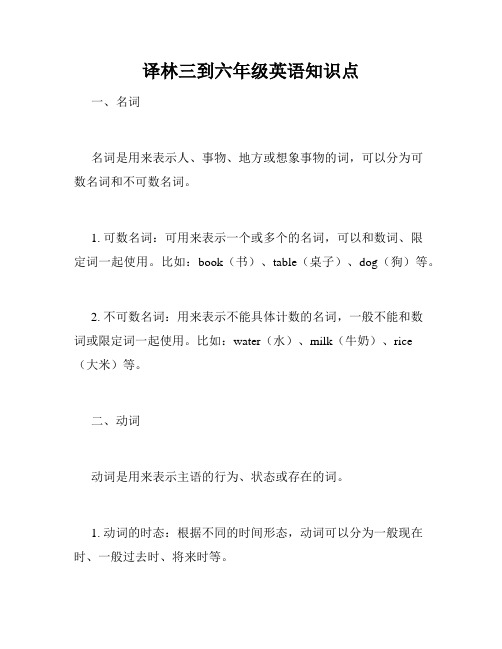
译林三到六年级英语知识点一、名词名词是用来表示人、事物、地方或想象事物的词,可以分为可数名词和不可数名词。
1. 可数名词:可用来表示一个或多个的名词,可以和数词、限定词一起使用。
比如:book(书)、table(桌子)、dog(狗)等。
2. 不可数名词:用来表示不能具体计数的名词,一般不能和数词或限定词一起使用。
比如:water(水)、milk(牛奶)、rice(大米)等。
二、动词动词是用来表示主语的行为、状态或存在的词。
1. 动词的时态:根据不同的时间形态,动词可以分为一般现在时、一般过去时、将来时等。
- 一般现在时:表示经常性、习惯性或客观事实。
例如:I go to school every day.(我每天去学校。
)- 一般过去时:表示过去发生的动作或存在的状态。
例如:She played soccer yesterday.(她昨天踢足球。
)- 将来时:表示将来要发生的动作或存在的状态。
例如:We will have a party tomorrow.(我们明天要开派对。
)2. 动词的语态:根据动作的主动或被动性质,动词可以分为主动语态和被动语态。
- 主动语态:表示主语执行动作。
例如:He wrote a letter.(他写信。
)- 被动语态:表示主语接受动作。
例如:The letter was written by him.(这封信是他写的。
)三、形容词形容词是用来形容名词的词。
1. 形容词的位置:形容词通常位于名词前边,用来修饰名词。
例如:a beautiful flower(一朵美丽的花)。
2. 形容词的比较级和最高级:形容词有原级、比较级和最高级三种形式。
- 原级:形容词的原级表示事物的基本特征。
例如:happy(快乐的)、big(大的)。
- 比较级:形容词的比较级表示两个事物之间的比较关系,一般在形容词后面加上-er。
例如:happier(更快乐的)、bigger(更大的)。
- 最高级:形容词的最高级表示三个或以上事物之间的比较关系,一般在形容词后面加上-est。
三年级到六年级英语知识点归纳总结

三年级到六年级英语知识点归纳总结
一、三年级英语知识点
1. 26个字母的学习:掌握26个字母的正确书写格式,并能够认识大写、小写字母,了解字母的顺序,能够听写字母。
2. 数字的学习:掌握1-10的数字,并能够进行简单的数字运算。
3. 颜色:了解常见的颜色,并能够听写英文表示颜色的单词。
4. 动物:了解常见的动物,并能够听写英文表示动物的单词。
5. 水果:了解常见的水果,并能够听写英文表示水果的单词。
6. 形状:了解常见的形状,并能够听写英文表示形状的单词。
7. 职业:了解常见的职业,并能够听写英文表示职业的单词。
8. 家庭成员:了解家庭成员之间的关系,并能够听写英文表示家庭成员的单词。
二、四年级英语知识点
1. 天气:了解常见的天气,并能够听写英文表示天气的单词。
2. 时间:掌握常用时间单位的表达方式,并能够听写英文表示时间的单词。
3. 季节:了解四季的季节特征,并能够听写英文表示季节的单词。
4. 学校生活:了解学校生活的方方面面,并能够听写英文表示
学校生活内容的单词。
5. 方向:掌握基本的方位表达方式,并能够听写英文表示方位的单词。
6. 日常活动:了解常见的日常活动,并能够听写英文表示日常活动内容的单词。
7. 爱好:了解常见的爱好,并能够听写英文表示爱好的单词。
小学英语三至六年级知识点归纳
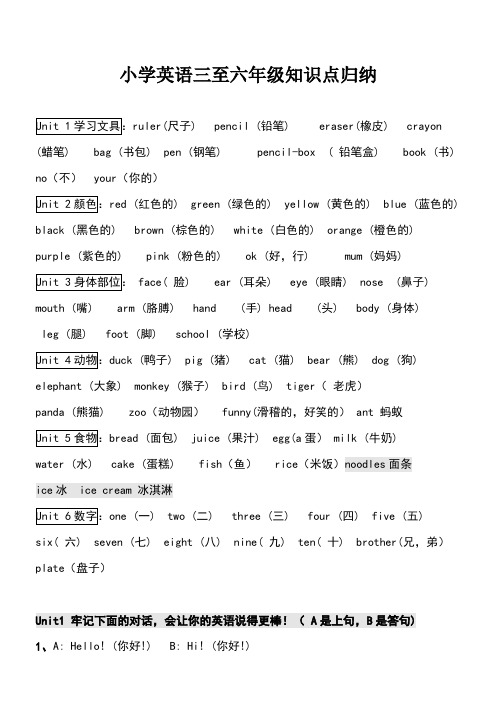
小学英语三至六年级知识点归纳ruler(尺子) pencil (铅笔) eraser(橡皮) crayon(蜡笔) bag (书包) pen (钢笔) pencil-box ( 铅笔盒) book (书) no(不) your(你的)red (红色的) green (绿色的) yellow (黄色的) blue (蓝色的) black (黑色的) brown (棕色的) white (白色的) orange (橙色的)purple (紫色的) pink (粉色的) ok (好,行) mum (妈妈)face( 脸) ear (耳朵) eye (眼睛) nose (鼻子)mouth (嘴) arm (胳膊) hand (手) head (头) body (身体)leg (腿) foot (脚) school (学校)duck (鸭子) pig (猪) cat (猫) bear (熊) dog (狗)elephant (大象) monkey (猴子) bird (鸟) tiger(老虎)panda (熊猫) zoo(动物园) funny(滑稽的,好笑的) ant 蚂蚁bread (面包) juice (果汁) egg(a蛋) milk (牛奶)water (水) cake (蛋糕) fish(鱼) rice(米饭)noodles面条ice冰 ice cream 冰淇淋one (一) two (二) three (三) four (四) five (五)six( 六) seven (七) eight (八) nine( 九) ten( 十) brother(兄,弟)plate(盘子)Unit1 牢记下面的对话,会让你的英语说得更棒!( A是上句,B是答句)1、A: Hello! (你好!) B: Hi! (你好!)2、A:What’s your name?你叫什么名字?B:My name’s Chen Jie.我的名字是陈洁。
三至六年级英语知识点总结人教版
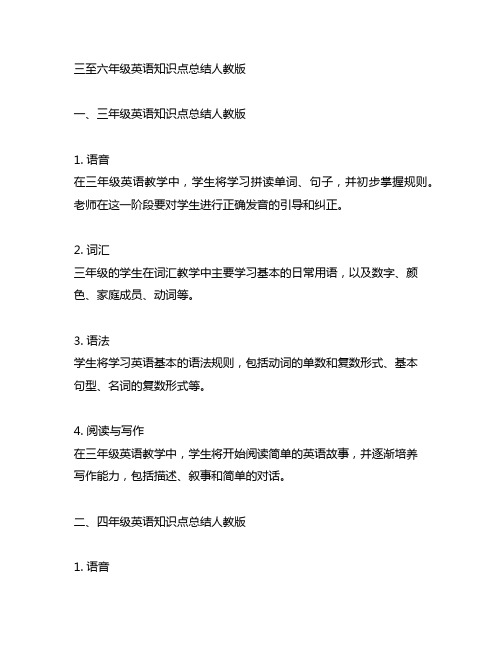
三至六年级英语知识点总结人教版一、三年级英语知识点总结人教版1. 语音在三年级英语教学中,学生将学习拼读单词、句子,并初步掌握规则。
老师在这一阶段要对学生进行正确发音的引导和纠正。
2. 词汇三年级的学生在词汇教学中主要学习基本的日常用语,以及数字、颜色、家庭成员、动词等。
3. 语法学生将学习英语基本的语法规则,包括动词的单数和复数形式、基本句型、名词的复数形式等。
4. 阅读与写作在三年级英语教学中,学生将开始阅读简单的英语故事,并逐渐培养写作能力,包括描述、叙事和简单的对话。
二、四年级英语知识点总结人教版1. 语音四年级学生将继续学习英语的基本语音,并增加了一些复杂的音标和发音规则。
2. 词汇在四年级英语教学中,学生将学习更加丰富的词汇,包括日常用语、动词短语、方位、时间、气候等。
3. 语法四年级学生将学习更加丰富和复杂的语法知识,包括时态、副词、形容词比较级和最高级等。
4. 阅读与写作在四年级英语教学中,学生将进一步提高阅读理解能力,学会用英语进行简单的书面表达,包括简单的作文、书信和日记。
三、五年级英语知识点总结人教版1. 语音五年级学生将继续巩固和扩展英语的语音知识,学会正确地发音和拼读包括复杂单词和句子在内的英语内容。
2. 词汇在五年级英语教学中,学生将学习更加丰富和复杂的词汇,包括日常用语、情感词汇、习惯用语、动词短语等。
3. 语法五年级学生将学习更加丰富和复杂的语法知识,包括主谓一致、语态、虚拟语气、倒装句等。
4. 阅读与写作五年级英语教学中,学生将进一步提高阅读理解能力,学会用更加丰富的语句进行书面表达,包括对话、判断、议论和叙述等。
四、六年级英语知识点总结人教版1. 语音六年级学生将继续巩固和扩展英语的语音知识,学会正确地发音和拼读更复杂的单词和句子。
2. 词汇在六年级英语教学中,学生将学习更加丰富和复杂的词汇,包括各类专业词汇、习惯用语、动词短语等。
3. 语法六年级学生将学习更加丰富和复杂的语法知识,包括倒装句、虚拟语气、被动语态等。
六年级英语全部知识点

六年级英语全部知识点一、基础语法知识1. 词性及词类转换:名词、动词、形容词、副词、代词、介词、冠词等。
2. 句子成分:主语、谓语、宾语、定语、状语等。
3. 时态和语态:一般现在时、一般过去时、一般将来时、被动语态等。
4. 比较级和最高级:形容词和副词的比较级和最高级形式及用法。
5. 直接引语和间接引语:使用和转换直接引语和间接引语。
6. 疑问句和否定句:构成和变换疑问句和否定句。
7. 句型转换:选择适当的句型进行句子转换。
二、词汇与短语1. 常用单词:认读和拼写常见单词,包括名词、动词、形容词、副词等。
2. 词组和短语:学习常用的固定搭配和日常用语表达。
3. 同义词和反义词:学习常见词语的同义词和反义词。
三、阅读理解1. 短文理解:阅读短文,回答问题或完成相关任务。
2. 阅读策略:使用不同的阅读策略,如预测、推理、细节获取等。
3. 阅读技巧:学习如何快速定位信息,并理解文章的主旨和要点。
四、写作技巧1. 句子构造:运用所学的语法知识构造完整的句子。
2. 选择恰当的词汇:根据语境选择合适的词汇。
3. 写作规范:注意句子结构和标点符号的使用。
4. 表达观点:用简洁明了的语言表达自己的观点和意见。
五、口语表达1. 日常用语:学习基本的问候和日常用语表达。
2. 对话交流:练习进行简单的对话和交流。
3. 角色扮演:模拟真实场景,进行角色扮演对话。
六、听力技巧1. 听懂关键信息:提高听力理解能力,抓住关键信息。
2. 根据所听内容回答问题:通过听力材料回答问题或完成相关任务。
3. 跟读练习:提高发音和语调,跟读所听内容。
七、语法综合运用1. 完形填空:根据上下文语境,选择合适的词汇填空。
2. 语法填空:根据所给的语法规则和句子结构,填写正确的词语。
3. 句型转换:根据提示,将句子进行结构转换。
4. 语法错误改正:找出句子中的语法错误,并进行修改。
八、语言知识运用1. 单句翻译:将中文句子翻译成英文,或将英文句子翻译成中文。
三年级起点六年级上册英语单元知识点总结
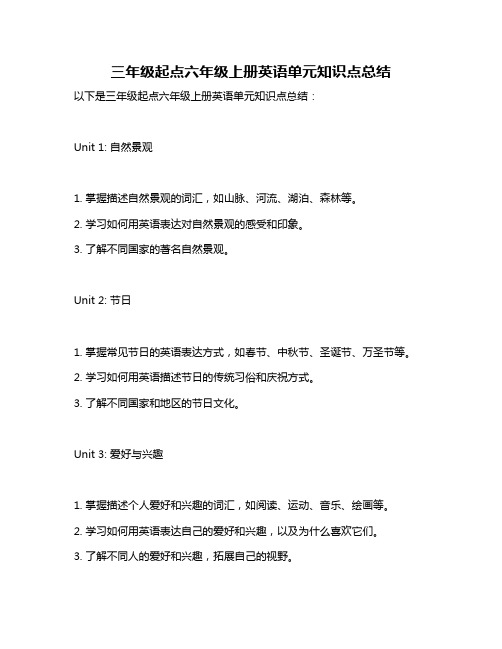
三年级起点六年级上册英语单元知识点总结
以下是三年级起点六年级上册英语单元知识点总结:
Unit 1: 自然景观
1. 掌握描述自然景观的词汇,如山脉、河流、湖泊、森林等。
2. 学习如何用英语表达对自然景观的感受和印象。
3. 了解不同国家的著名自然景观。
Unit 2: 节日
1. 掌握常见节日的英语表达方式,如春节、中秋节、圣诞节、万圣节等。
2. 学习如何用英语描述节日的传统习俗和庆祝方式。
3. 了解不同国家和地区的节日文化。
Unit 3: 爱好与兴趣
1. 掌握描述个人爱好和兴趣的词汇,如阅读、运动、音乐、绘画等。
2. 学习如何用英语表达自己的爱好和兴趣,以及为什么喜欢它们。
3. 了解不同人的爱好和兴趣,拓展自己的视野。
Unit 4: 动物世界
1. 掌握常见动物的英语表达方式,如猫、狗、鸟、鱼等。
2. 学习如何用英语描述动物的外貌特征、习性和生活环境。
3. 了解保护动物的重要性,培养爱护动物的意识。
Unit 5: 科普知识
1. 掌握关于科技发展的词汇,如机器人、人工智能、太空探索等。
2. 学习如何用英语表达对科技发展的看法和展望。
3. 了解科技在生活中的应用和影响。
以上是六年级上册英语五个单元的知识点总结,希望对你有所帮助。
由于英语知识点较多,在学习过程中,建议结合教材和课堂讲解,多做练习,加深理解和记忆。
三至六年级英语知识点归纳
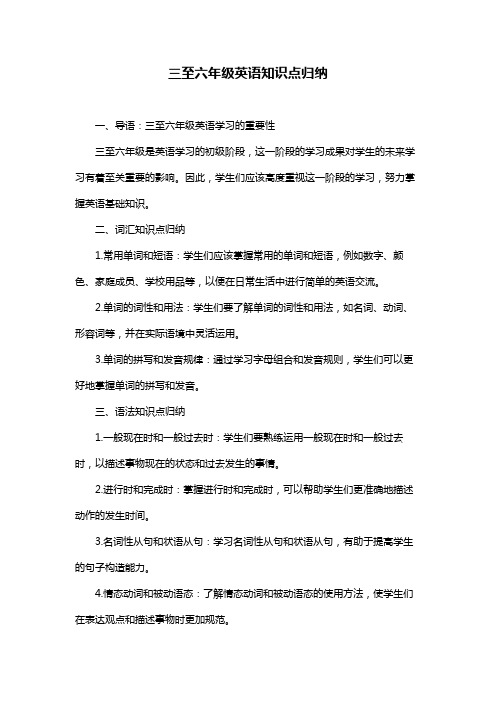
三至六年级英语知识点归纳一、导语:三至六年级英语学习的重要性三至六年级是英语学习的初级阶段,这一阶段的学习成果对学生的未来学习有着至关重要的影响。
因此,学生们应该高度重视这一阶段的学习,努力掌握英语基础知识。
二、词汇知识点归纳1.常用单词和短语:学生们应该掌握常用的单词和短语,例如数字、颜色、家庭成员、学校用品等,以便在日常生活中进行简单的英语交流。
2.单词的词性和用法:学生们要了解单词的词性和用法,如名词、动词、形容词等,并在实际语境中灵活运用。
3.单词的拼写和发音规律:通过学习字母组合和发音规则,学生们可以更好地掌握单词的拼写和发音。
三、语法知识点归纳1.一般现在时和一般过去时:学生们要熟练运用一般现在时和一般过去时,以描述事物现在的状态和过去发生的事情。
2.进行时和完成时:掌握进行时和完成时,可以帮助学生们更准确地描述动作的发生时间。
3.名词性从句和状语从句:学习名词性从句和状语从句,有助于提高学生的句子构造能力。
4.情态动词和被动语态:了解情态动词和被动语态的使用方法,使学生们在表达观点和描述事物时更加规范。
四、阅读和写作技巧1.阅读理解策略:学生们要学会运用阅读理解策略,如预测、扫描、细读等,提高阅读效果。
2.写作结构和方法:掌握写作的基本结构和方法,如开头、正文、结尾等,使文章条理清晰。
3.提高阅读和写作水平的建议:多读、多写、多练,积累词汇和语法知识,不断提高阅读和写作水平。
五、口语交际知识点归纳1.日常问候和礼貌用语:学生们要熟练掌握日常问候和礼貌用语,如Hello、Good morning、Thank you等。
2.描述人和事物的方法:学会用英语描述人和事物,如外貌、性格、喜好等。
3.表达喜好和意见的方式:学生们要学会用英语表达自己的喜好和意见,如I like、I don"t like等。
六、学习方法和习惯1.制定学习计划和目标:学生们要制定合理的学习计划和目标,有针对性地进行学习。
三到六年级英语知识点汇总

小学英语词汇归类表(三年级上册----六年级下册) 一、学习用品(school things) pen(钢笔)? pencil(铅笔)?? pencil-case(铅笔盒) ?ruler(尺子)?? book(书)? post card(明信片) comic book(漫画书)? bag(包)? newspaper(报纸)?? schoolbag (书包)?? eraser(橡皮)??? crayon(蜡笔)?? sharpener(卷笔刀)?? story-book(故事书)?notebook(笔记本)? Chinese book(语文书)? English book(英语书)? math book(数学书) magazine(杂志)? dictionary(字典,词典)二、人体(body)foot(脚)? nose(鼻子)?? head(头)? face(脸)? hair(头发)? mouth(嘴)? eye(眼睛)? ear(耳朵)? arm(手臂)? hand(手)?finger(手指)? leg(腿)? tail(尾巴)三、颜色(colours)colour(颜色)? red(红) blue(蓝)? yellow(黄) green(绿)white(白)black(黑)? pink(粉红)???? purple(紫)???? orange(橙)???? brown(棕)四、动物(animals)cat(猫)dog(狗)pig(猪)duck(鸭)rabbit(兔)horse(马)elephant(大象)fish(鱼)kangaroo(袋鼠)ant(蚂蚁)??? bird(鸟)? eagle(鹰)? beaver(海狸)? snake(蛇)? mouse(老鼠)? squirrel(松鼠)? monkey(猴)? panda(熊猫)? bear(熊)? lion(狮子)? tiger(老虎)? fox(狐狸)? zebra(斑马)? deer(鹿)???? giraffe(长颈鹿)? goose(鹅)? hen(母鸡)? turkey(火鸡)? lamb(小羊)? sheep(绵羊)? goat(山羊)? cow(奶牛)? donkey(驴)? squid(鱿鱼)? lobster(龙虾)? shark(鲨鱼)? seal(海豹)? sperm whale(抹香鲸)? killer whale(虎鲸)五、人物(people)friend(朋友)?? boy(男孩)? girl(女孩) mother(母亲)father(父亲)sister(姐妹)? brother(兄弟) uncle(叔叔,舅舅)mom(妈妈)grandpa/ grandfather(祖父,外祖父)?? man(男人)??? woman(女人)????? Mr(先生)?? Miss(小姐)???? lady(女士,小姐)? dad(爸爸)?? ?parents(父母)????? grandma/ grandmother(祖母,外祖母)? aunt(姑姑)? cousin(堂表兄弟,堂表姐妹)?? son(儿子)??? baby(婴儿)???? kid(小孩)? classmate(同学)? queen(女王)??? visitor(参观者)?? neighbour(邻居)? principal(校长)? university student(大学生)??? pen pal(笔友)??? tourist(旅行者)? people(人物)? robot(机器人)六、职业(jobs)teacher(教师)student(学生)doctor(医生) nurse(护士)driver(司机)farmer(农民)singer(歌唱家)writer(作家)actor(男演员)actress(女演员)artist(画家)TV reporter(电视台记者)engineer(工程师)accountant(会计) policeman(警察)salesperson(销售员)cleaner(清洁工)? baseball player(棒球运动员)? assistant(售货员)七、食品、饮料(food & drink)rice(米饭) bread(面包)? beef(牛肉) milk(牛奶)water(水)egg(蛋)fish(鱼) tofu(豆腐)chicken(鸡肉)? honey(蜂蜜)?? lunch(中餐) cake(蛋糕)?? hot dog(热狗)? hamburger(汉堡包)? French fries(炸薯条)?? cookie(曲奇)? biscuit(饼干)? jam(果酱)?? noodles(面条)?? meat(肉)?? pork(猪肉)? mutton(羊肉)? vegetable(蔬菜)? salad(沙拉)?? soup(汤)? ice-cream(冰淇淋)ice(冰)? Coke(可乐) juice(果汁)? tea(茶) coffee(咖啡)?? breakfast(早餐) dinner(晚餐)?八、水果、蔬菜(fruit & vegetables)apple(苹果)? banana(香蕉) watermelon(西瓜)??? pear(梨)orange(橙)grape(葡萄)eggplant(茄子)green beans(青豆)tomato(西红柿)potato(土豆)? peach(桃)????? strawberry(草莓)?? cucumber(黄瓜)????? onion(洋葱)?????? carrot(胡萝卜)? cabbage(卷心菜)?九、衣服(clothes)jacket(夹克衫)shirt(衬衫)T-shirt(T恤衫) shirt(短裙子)dress(连衣裙)jeans(牛仔裤)pants(长裤) socks(袜子)??? shoes(鞋子)?? sweater(毛衣)???? coat(上衣)?? raincoat(雨衣)? shorts(短裤)??? sneakers(网球鞋)? slippers(拖鞋)???? sandals(凉鞋)?? boots(靴子)??????? hat(有沿的帽子)? cap(便帽)??tie(领带)? scarf(围巾)???? gloves(手套)?? sunglasses(太阳镜)??十、交通工具(vehicles)bike(自行车)?? bus(公共汽车)train (火车)?? boat(小船)? ship(轮船)? yacht(快艇)?? car(小汽车)?? taxi(出租车)???? jeep(吉普车)? van(小货车)? plane(飞机)? subway(地铁)????? motor cycle(摩托车) 十一、杂物(other things)window(窗户)? door(门)? computer(计算机)???? desk(课桌)?? chair(椅子)???? bed(床)???board(写字板)teache r’s desk(讲台) fan(风扇)????? light(灯)wall(墙壁)?? floor(地板)???? picture(图画,照片)curtain(窗帘)?? closet(壁橱) trash bin(垃圾箱) mirror(镜子) end table(床头柜)football(足球)? present(礼物) walkman(随身听)? lamp(台灯)???? phone(电话)????????? sofa(沙发)???? shelf(书架)?fridge(冰箱)????? table(桌子)???? air-conditioner(空调)??? TV(电视)?????? key(钥匙)? lock(锁)???????? photo(照片)???? chart(图表)??????????? plate(盘子)?? knife(刀)?? fork(叉)?? spoon(勺子)???? chopsticks(筷子)?????? pot(锅)????? gift (礼物)???? toy(玩具)??????? doll(洋娃娃)??? jigsaw puzzle(拼图游戏)? ball(球)????? kite(风筝)??? balloon(汽球)???? box(盒子)????? umbrella(伞)????????? zipper(拉链)?? violin(小提琴)? yo-yo(溜溜球)??? nest(鸟窝)????? toothbrush(牙刷)?? hole(洞)???? tube(管子)??? menu(菜单)???? e-card(电子贺卡)?e-mail(电子邮件)????? money( 钱)?? medicine(药)十二、地点(locations)home(家)room(房间)?????? living room(起居室,客厅)bedroom(卧室)??? study(书房)?kitchen(厨房)?? bathroom(卫生间)?? classroom(教室)school(学校)park(公园)????? library(图书馆)?????? post office(邮局) hospital(医院)? cinema(电影院) bookstore(书店)farm(农场)?? zoo(动物园)?? garden(花园)?? playground(操场)? canteen(食堂)????? gym(体育馆)?? teacher’s office(教师办公室)? washroom(卫生间)? art room(绘画教室) music room(音乐教室)? computer room(计算机教室) TV room(电视机房)? flat(公寓)???????? company(公司)??????? factory(工厂)??? fruit stand(水果摊)? pet shop(宠物商店) naturepark(自然公园)? theme park(主题公园)????? supermarket(超市)bank(银行)?? the Great Wall(长城)?? science museum(科学博物馆)?? country(国家)? village(乡村)? city(城市)?十三、课程(classes)class(课程)Chinese(中文,汉语)English(英语)math(数学)P.E.(体育) music(音乐) science (科学)? ?sports(体育活动)? Moral Education(思想品德课)? Social Studied(社会课)十四、国家、城市(countries & cities)China/ PRC(中国)? American/ USA(美国)? UK(联合王国)???? England(英国)? Canada/ CAN(加拿大)?? Australia(澳大利亚)? ?New York(纽约)?? ?London(伦敦)? Sydney(悉尼)?? Moscow(莫斯科)?? Cairo(开罗)十五、天气(weather)cold(寒冷的) warm(温暖的)cool(凉爽的) snowy(下雪的)sunny(晴朗的)hot(炎热的) rainy(下雨的) windy(有风的)? cloudy(多云的) weather report(天气预报)十六、景物(nature)river(河流) lake(湖泊) stream(河、溪)forest(森林)???? path(路,小道)? road(公路,大道)house(房子bridge(桥)building(建筑物)rain(雨)?? cloud(云)? sun(太阳) mountain(山) ?sky(天空)? ?rainbow(彩虹) ?wind(风)??? air(空气)十七、植物(plants)flower(花)grass(草)seed(种子)sprout(苗,芽,嫩芽)tree(树) ?plant(植物,种植)soil(土壤)rose(玫瑰)????????? leaf(叶子)?十八、星期(week)Monday/ Mon. (星期一)Tuesday /Tue. (星期二)?? Wednesday /Wed. (星期三)Thursday /Thu. (星期四)? Friday /Fri. (星期五) Saturday /Sat. (星期六)Sunday /Sun. (星期日)?? weekend(周末)十九、月份(months)Jan.(January 一月)Feb.(February 二月) Mar.(March 三月)Apr.(April 四月)May(五月)June(六月)July(七月)Aug.(August 八月)Sept.(September 九月)Oct.(October十月)Nov.(November 十一月) ?Dec.(December十二月)二十、季节(seasons)spring(春)summer(夏)fall(秋)winter(冬)二十一、方位(directions)left(左边)right(右边) east(东)????? west(西)????? south(南)?? north(北)二十二、患病(illness)hurt(疼痛)sore(疼的)? ?have a cold(感冒)????? have a fever(发烧)? ??? have a toothache(牙疼)have a headache(头疼)have a sore throat(喉咙疼)二十三、数词(numbers)one(一) two(二) three(三) ?four(四) five(五)?? six(六)seven(七)? eight(八)nine(九)ten(十) eleven(十一) twelve(十二)thirteen(十三)fourteen(十四)? fifteen(十五)sixteen(十六)? seventeen(十七) eighteen(十八)? nineteen(十九)? twenty(二十) thirty(三十)?? forty(四十) ?fifty(五十)??? sixty(六十) seventy(七十)? eighty(八十)? ninety(九十)? hundred(百)??? first(第一)? second(第二)?? third(第三)???? fourth(第四)? fifth(第五)?eighth(第八)?? ninth(第九)???? twelfth(第十二) ?twentieth(第二十)二十四、形容词(adj.)good(好的)????????? big(大的)?? small(小的)?? long(长的)? tall(高的)short(短的,矮的)young(年轻的) old(旧的,老的)strong(健壮的)thin(瘦的)active(积极活跃的)quiet(安静的)? kind(和蔼亲切的)strict(严格的)smart(聪明的)funny(滑稽可笑的)? tasty(好吃的)? sweet(甜的)???salty(咸的)sour(酸的)favourite(最喜爱的)? fresh(新鲜的) clean(干净的)?? tired(疲劳的)excited(兴奋的)angry(生气的,愤怒的)happy(高兴的) sad(忧愁的,悲伤的) bored(无聊的,烦人的) taller(更高的)shorter(更矮的)stronger(更强壮的)older(年龄更大的)younger(更年轻的)bigger(更大的)heavier(更重的) longer(更长的)thinner(更瘦的)smaller(更小的) nice(好看的)? fine(好的)? great(很好的)? heavy(重的)? new(新的)? fat(胖的)? happy(快乐的)? right(对的)? hungry(饥饿的)? cute(逗人喜爱的)?little(小的)? lovely(可爱的)? beautiful(漂亮的)? colourful(色彩鲜艳的)? pretty(漂亮的)? cheap(便宜的)? expensive(昂贵的)? juicy(多汁的)? tender(嫩的)? healthy(健康的)? ill(有病的)? helpful(有帮助的)? high(高的)? easy(简单的)? proud(骄傲的)? sick(有病的)? better(更好的) higher(更高的)二十五、介词(prep.)in(在……里)??? ? on(在……上,在……时候)?? under(在……下面)near(在……旁边)? behind(在……后面)?? next to(与……相邻)at(在……点钟) by(经……乘……)?for(为……,给……) to(朝,向) over(在……上方)????? in front of(在……前面)二十六、代词(pron.)I(我)me ?we(我们)us ?you(你,你们)you ?he(他)him? she(她)her it(它)it? they(他/她/它们)themmy(我的)mine our(我们的)ours your(你的,你们的)yours his(他的)his her(她的)hers? this(这,这个)? that(那,那个)二十七、动词(v.)work(工作)??????????? play(玩,踢)?????????? swim(游泳)???????????? skate(滑冰)? fly(飞)?? ?jump(跳) ?walk(走) run(跑)? climb(往上爬) ?fight(打架)???????????? swing(荡)??? eat(吃)? sleep(睡觉)?? ?like(像,喜欢) ?have(有,吃)?? ?turn(转弯)?buy(买)? ?take(买,带)? ?live(居住)?? ?teach(教)? stop(停,停车站)?? wait(等)? study(学习)??learn(学习)? sing(唱歌)??? dance(跳舞)??? row(划)??? do homework(做作业)? ?watch TV(看电视)???? ?read books(读书)? cook the meals(做饭)????? ?water the flowers(浇花)?????? sweep the floor(扫地)???? clean the bedroom(打扫卧室)? make the bed(铺床)?????????? set the table(摆饭桌)???? wash the clothes(洗衣服)????? do the dishes(洗碗碟)???????? use acomputer(使用计算机)? eat breakfast(吃早饭)???????? eat dinner(吃晚饭)??? do morning exercises(晨练,做广播操)???????? go toschool(上学)??????????? play sports(进行体育运动)???? get up(起床)?????????? have English class(上英语课)?? climb mountains(爬山)?????? play the piano(弹钢琴)??? fly kites(放风筝)????????????? make a snowman(堆雪人)???? plant trees(种树) draw pictures(画画)?????????? cook dinner(做饭)?????????? read a book(看书)???????? answer the phone(接电话)???? listen to music(听音乐)??????? clean the room(打扫房间)? write a letter(写信)?????????? write an e-mail(写电子邮件)?? drink water(喝水) take pictures(照相)?????????? watch insects(观察昆虫)?????? pick up leaves(采摘树叶)? do an experiment(做实验)???? catch butterflies(捉蝴蝶)???? ?count insects(数昆虫)? collect insects(收集昆虫)????? collect leaves(收集树叶)?????? write a report(写报告)? play chess(下棋)???????????? have a picnic(举行野餐)?????? get to(到达)? ride a bike(骑自行车)??????? play the violin(拉小提琴)?????? make kites(制作风筝)? collect stamps(集邮)????? ???go shopping(买东西)?????????? go swimming(去游泳)? go fishing(去钓鱼)?????????? go hiking(去远足)???????????? go skiing(去滑雪)? go ice-skating(去滑冰)??????? visit grandparents(看望祖父母/外祖父母) meet(见面)??????welcome(欢迎)????? thank(谢谢)?????? love(爱)?????? drink(喝)? taste(尝)???????? smell(闻)?????????? feed(喂养)???????shear(剪)?????? milk(挤奶)? look(看)???????? guess(猜)?????????? help(帮助)??????? pass(传递)???? show(展示)? use(使用)??????? clean(打扫)???????? open(打开)??????? close(关上)??? put(放)????? read(读)???????? write(写)?????????? paint(绘画)??????? tell(告诉)????? kick(踢)? bounce(反弹)???? ride(骑)??????????? find(寻找)??????? drive(驾驶)???? fold(折)? send(寄)????????wash(洗)????????? shine(照耀)??????? become(变成)??? feel(感觉到)? think(思考)????? fall(落下)????????? leave(离开)??????? wake up(醒来)??? put on(穿上)? take off(脱掉)??? hang up(挂起)?????wear(穿)????? go home(回家)?????????? go to bed(上床睡觉)?????? play computer games(玩电脑游戏)? do housework(做家务)??? empty the trash(倒垃圾)???? put away the clothes(收拾衣服)??? get off(下车)??????????? take a trip(去旅行)????????? read a magazine(阅读杂志)?????? go to the cinema(去看电影)二十八、其他(others)day(天,日子)??????? today(今天)???????? date(日期)??????? yes(是,是的)??????? no(不,不是)????????? not(不,不是的)?????? o’clock(……点钟)? time(时间)??????? here(这儿,这里)???? there(那儿,那里)??? very(很,非常)??? but(但是) then(然后) ??????????and(和)???????????? too(也,太)?????? next week(下周)? last(上一个,仅余的,留在最后的)???????? noon(中午)??????? evening(夜晚,晚上) please(请)?????????? usually(通常,一般)?? often(经常)?????? sometimes(有时候)? hobby(兴趣,爱好)??best(最,极)????????? because(因为)??? straightly(成直线地) birthday(生日)?????? traffic(交通)???????? traffic light(交通灯) traffic rule(交通规则)? matter(事情,麻烦)? should(应该)???????? comefrom(从……来,来自……) this morning(今天上午) ???this afternoon(今天下午) ???this evening(今天晚上)二十九、动词的第三人称单数形式watch—watches??? teach—teaches? wash--washes? go—goes?? do—does???have—has?? ?read—reads?????? live—lives??三十、动词的-ing形式run—running????? swim—swimming??? shop—shopping?? sit—sitting? put—putting have—having????? live—living????? ?make—making?????? take—taking??? use—using? dive—diving? ?write—writing ?ride—riding?? go—going????????? do—doing??????? walk—walking?????? jump—jumping?climb—climbing??? play—playing???? teach—teaching????? catch—catching ???watch—watching?? read—reading???? cook—cooking??????? clean—cleaning??? answer—answering listen—listening??? collect—collecting??? count—counting?三十一、动词的过去式watch—watched ?wash—washed is/am—was are—were clean—cleaned????? play—played? visit—visited?? learn—learned?? climb—climbed???? row—rowed? dance—danced? do—did?? go—went? sing—sang?? eat—ate? take—took?????????? have—had see—saw?? buy—bought? read—read ?hurt—hurt?? draw—drew?? put--put三十二、形容词的比较级tall—taller??? short—shorter?old—older? ?young—younger? small—smaller?????? long—longer? ?strong—stronger? big—bigger???????? thin—thinner? heavy—heavier?三十三、疑问词what(什么)???????? which(哪一个)?????? when(什么时候)?????? where(在哪里)? why(为什么)?????? how(怎样,如何)???? how many(多少)????? how much(多少钱)? what about…(……怎么样)? what time(几点)?三十四、单词的缩写I’m = I am?? ?it’s = it is????? he’s = heis?? ?she’s = she is ??that’s = that is?????? who’s = who is??? what’s = what is ?????they’re = they are ????isn’t = is not? ????aren’t = are not ??can’t = cannot????? don’t = do not??????? doesn’t = does not?? ???let’s = let us三十五、同音词one—won?? two--too?? four—for? by—buy? red—read? no—know? flour—flower wear—where? there—their? pair--pear? ear—year? ?flu--flew? hear—here? I—eye? B—be? C—see? R—are? T—tea? U—you ??son—sun??? right—write??weak--week??????????????????????? ? ? ?小学PEP英语四会单词和句子四年级?home? room? school? classroom? door chair? bed? desk?? window?? bread? egg? milk? water? rice? beef? chicken? fish?? sister?? brother??? father? mother?? farmer?? driver??? nurse?? doctor????????? computer?? board?? fan? light? teacher’s desk? picture? floor?? wall? one? two? three? four? five? six? seven? eight? nine? ten? music?? math?? Chinese?? English?? P.E.? red? blue? yellow? green?? white?? skirt? shirt? jacket? dress? T-shirt jeans pants? socks? shoes? sunny? warm?? cold?? snowy? big? small? long? short?? nice apple banana? pear? orange watermelon? cat? rabbit?? pig?? duck? dog? eleven?? twelve??? thirteen? fifteen? twenty This is my computer.? That is your computer. Is this a teacher’s desk?? Yes, it is.?????????????? ?What time is it?? It’s two o’clock. It’s 9:45.? It’s time for math class.??????????????? Is this your T-shirt?? No, it’s not. What colour is it?? It’s white.??????? It’s warm today.? Let’s play football.??? It’s cool.??? Is it cold??? Yes, it is. / No, it isn’t.It’s……??????? How much is it?? It’s ten yuan. How much a re they??They’re three yuan.????????? ?Are they ducks?? No, they aren’t. How many horses are there?? Twelve.五年级上册?young? funny? tall? strong kind old? short? thin? smart active?? strict? quiet Monday (Mon.)? Tuesday (Tue.)? Wednesday (Wed.)? Thursday (Thu.)? Friday (Fri.)? Saturday (Sat.)? Sunday (Sun.)?? do homework? watch TV? read books green beans eggplant?? fish ?tofu potato tomato tasty sweet? sour? fresh? salty? cook the meals?? water the flowers?? sweep the floor?? clean the bedroom??? make the bed??? set the table? wash the clothes?? do the dishes? use a computer curtain? trash bin? closet? mirror?? end table? ?clothes? in? on? under? behind? near? over ?in front of?? next to mountain? river? flower grass? lake? forest? path? park? house? bridge? tree? road? building? Who’s your English teacher?? Mr. Carter.???????? ?What’s he like?? He’s tall and strong. Is she quite? No, she isn’t. She’s very active. ??Is she strict? Yes, she is, but she’s very kind. What day is it today?? It’s Wednesday. ?What do you have on Thursday?? We have English, math and science on Thursdays. What do you do on Saturdays?? I watch TV on Saturdays. What do you have for lunch on Mondays? ?We have tomatoes, tofu and fish. What’s your favourite fruit?? I like apples.? They’re sweet.? I like fruit.? But I don’t like grapes.? They’re sour. What can you do? ?I can sweep the floor. ??I can cook the meals.? I can water the flowers. Can you make the bed??No, I can’t. ??????Can you use a computer?? Yes, I can. There are two bedrooms, a kitchen, a bathroom and a living room. There is a mirror, a bed and a big closet. The closet is near the table.? Many clothes are in the closet. The trash bin is behind the door.??????? ???Is there a forest in the park?? Yes, there is. Is there a river?? No, there isn’t. ????????Are there any fish in the rivers?? Yes, there are.??????? Are there any pandas in the mountains?? No, there aren’t.五年级下册do morning exercises? eat breakfast?? have English class? play sports????? eat dinner?? get up? climb mountains? go shopping?? play the piano????? visit grandparents? go hiking? spring??? summer?? fall? winter? season? swim? fly kites? skate?? make a snowman?? plant trees? January (Jan.)? February (Feb.)? March (Mar.)? April (Apr.)?? May??? June? July? August (Aug.)? September (Sept.)? October (Oct.)? November (Nov.)?? December (Dec.)? draw pictures?? cook dinner??? read a book??? answer the phone?? do the dishes?? listen to music?? clean the room? wash clothes? ?write a letter?? write an e-mail? fly? jump walk? run? swim?? sleep?? climb?? fight??? swing?? drink water? take pictures? watch insects?? pick up leaves?? collect leaves? do an experiment? catch butterflies ?count insects? ?write a report??? play chess? have a picnic?? When do you eat dinner?? I eat dinner at 7:00 in the evening. When do you get up?? I usually get up at 12:00 at noon.What do you do on the weekend? ??Usually I watch TV and go shopping. Sometimes I visit my grandparents. What about you? ??I often play football.? Sometimes I go hiking. Which season do you like best?? I like winter best. Summer is good, but fall is my favourite season. Why do you like summer?? Because I can swim in the lake. Why do you like winter? Because I can sleep a long time. When is your birthday?? It’s in May. My birthday is in June. Uncle Bill’s birthday is in June, too. Is her birthday in June?? Yes.? What’s the date?? June 9th .???????? ?This is Zhang Peng.? What are you doing?? I’m doing the dishes.? I’m reading a book. Grandpa is writing a letter. Brother is doing homework. Mom is cooking dinner in the kitchen.? ?He’s writing an e-mail in the study.???? ?What is it doing?? It’s eating bananas.? What is she doing? She’sjumping. ?????????????What are they doing? They’re swimming.?????????? They’re climbing trees.??????????????????????? ?Are you eating lunch?? No, we aren’t. Are they eating the honey?? Yes, they are.???????????? ?Is he playing chess?? Yes, he is. Is she counting insects?? No, she isn’t. 六年级上册on foot? by bike? by bus? by train? by plane? by ship? by subway go to school? traffic lights? traffic rules? stop? wait? go get to? library? post office? hospital? cinema? bookstore?????? turn right?? turn left? go straight??? this morning? this afternoon?? this evening?? next week? comic book?? post card?? newspaper?? ride a bike? dive?play the violin? make kites? collect stamps? ?lives?? teaches? watches? goes? does? doesn’t=does not ???singer? writ er actor? actress artist? TV reporter? engineer? accountant?? policeman? cleaner? salesperson? rain? cloud? sun?? stream?? seed?? soil??? sprout?? plant?? ??????? How do you go to school, Sarah? ?Usually I go to school on foot.? Sometimes I go by bike. How can I get to Zhongshan Park?? You can go by the No.15 bus. Where is the cinema, please??? It’s next to the hospital. Turn left at the cinema, then go straight.? It’s on the left. What are you going to do on the weekend? I’m going to visit my grandparents this weekend. Where are you going this afternoon?? I’m going to the bookstore. What are you going to buy?? I am going to buy a comic book. What’s your hobby??I like collecting stamps. ???????????He likes collecting stamps, too. Does she teach English?? No, she doesn’t.? ???Does she teach your math?? Yes, she does. What does your mother do?? She is a TV reporter.? ?Where does she work?? She works in a school. How does she go to work?? She goes to work by bus. Where does the rain come from?? It comes from the clouds. How do you do that???????? ?What should you do then?六年级下册taller? shorter? stronger?? older?? younger? bigger? heavier?????? longer? thinner? smaller? ?have a fever???? hurt??? have a cold??? have a toothache have a headache? have a sore throat??????????? tired?? excited?? angry?? happy?? bored?? sad(watch TV - watched TV)? (wash clothes- washed clothes)?? (clean the room- cleaned the room)? (play football - played football)? (visit grandparents- visited grandparents)? do - did?? go - went?? (go to a park- went to a park)? (go swimming- went swimming)? (read a book-read a book)? (go fishing- went fishing)? (go hiking- went hiking) (learn Chinese-learned Chinese) (sing and dance-sang and danced)? (eat good food-ate good food)? (climb a mountain-climbed a mountain) (take pictures-took pictures)? (buy presents – bought presents)? (row a boat – rowed a boat)? (see elephants – saw elephants)? (go skiing-went skiing)? (go ice-skating-wentice-skating) (get to – got to)? (have – had)? How tall are you?? I’m 164 cm tall.? ?You’re shorter than me.? You’re 4 cm taller than me. How heavy are you?? I’m 48 kg.? ????I’m thinner and shorter than you. What’s the matter? ?My throat is sore.? My nose hurts. ? How are you, Liu Yun?? You look so happy. ???How are you, Sarah?? You look sad today. What did you do last weekend??? I played football. Did you read books??? Yes, I did.? /? No, I didn’t. Where did you go on your holiday?? I went to Xinjiang. ?How did you go there??? I went by train.小学英语三年级上册重点句子1.A: Hello!??你好?B: Hi!? 你好!2.A: Hello,I’m Wu Yifan.? 你好,我是吴一凡。
三至六年级的重点英语单词

三至六年级的重点英语单词三至六年级是学习英语的关键阶段。
在这个阶段,学生将学习更多的单词,并开始构建句子和进行简单的对话。
以下是三至六年级重点英语单词的详细介绍。
三年级重点英语单词:1. apple - 苹果2. book - 书3. cat - 猫4. dog - 狗5. elephant - 大象6. fish - 鱼7. girl - 女孩8. hat - 帽子9. ice cream - 冰淇淋10. juice - 果汁11. key - 钥匙12. lion - 狮子13. mouse - 鼠标14. nose - 鼻子15. orange - 橙子16. pen - 钢笔17. queen - 女王18. rabbit - 兔子19. sun - 太阳20. tiger - 老虎21. umbrella - 雨伞22. violin - 小提琴23. window - 窗户24. xylophone - 木琴25. yellow - 黄色26. zoo - 动物园27. bird - 鸟28. car - 汽车29. dinosaur - 恐龙30. flower - 花31. house - 房子32. moon - 月亮33. pencil - 铅笔34. rainbow - 彩虹35. star - 星星36. table - 桌子37. tree - 树38. boat - 船39. cake - 蛋糕40. chair - 椅子四年级重点英语单词:1. brother - 兄弟2. classroom - 教室3. door - 门4. friend - 朋友5. garden - 花园6. happy - 开心的7. jump - 跳跃8. key - 钥匙9. laugh - 笑10. mother - 母亲11. pencil case - 铅笔盒12. river - 河13. sun - 太阳14. tiger - 老虎15. umbrella - 雨伞16. violin - 小提琴17. window - 窗户18. xylophone - 木琴19. yellow - 黄色20. zoo - 动物园21. bird - 鸟22. car - 汽车23. dinosaur - 恐龙24. flower - 花25. house - 房子26. moon - 月亮27. pencil - 铅笔28. rainbow - 彩虹29. star - 星星30. table - 桌子31. tree - 树32. boat - 船33. cake - 蛋糕34. chair - 椅子35. computer - 电脑36. dog - 狗37. elephant - 大象38. fish - 鱼39. girl - 女孩40. hat - 帽子五年级重点英语单词:1. breakfast - 早餐2. computer - 电脑3. dinner - 晚餐4. explore - 探索5. football - 足球6. garden - 花园7. homework - 家庭作业8. language - 语言9. music - 音乐10. school - 学校11. science - 科学12. soccer - 足球13. technology - 技术14. tennis - 网球15. vacation - 假期16. art - 艺术17. ballet - 芭蕾舞18. basketball - 篮球19. biology - 生物20. chemistry - 化学21. guitar - 吉他22. history - 历史23. library - 图书馆24. mathematics - 数学25. painting - 绘画26. physics - 物理27. swimming - 游泳28. volcano - 火山29. waterfall - 瀑布30. wildlife - 野生动植物31. microscope - 显微镜32. telescope - 望远镜33. bicycle - 自行车34. aeroplane - 飞机35. spaceship - 宇宙飞船36. earthquake - 地震37. hurricane - 飓风38. meteorology - 气象学39. geography - 地理学40. architecture - 建筑学六年级重点英语单词:1. airport - 机场2. bicycle - 自行车3. city - 城市4. family - 家庭5. holiday - 假期6. introduce - 介绍7. library - 图书馆8. picture - 图片9. restaurant - 餐厅10. travel - 旅行11. apartment - 公寓12. beach - 海滩13. climate - 气候14. culture - 文化15. economics - 经济学16. education - 教育17. festival - 节日18. gallery - 画廊19. health - 健康20. internet - 互联网21. job - 工作22. mountain - 山23. newspaper - 报纸24. ocean - 海洋25. park - 公园26. planet - 行星27. recipe - 食谱28. safety - 安全29. shopping - 购物30. society - 社会31. sport - 运动32. technology - 技术33. theatre - 剧院34. tour - 旅游35. weather - 天气36. wildlife - 野生动植物37. zoo - 动物园38. adventure - 冒险39. career - 职业40. challenge - 挑战总结:通过学习以上重点英语单词,三至六年级的学生将能够扩展他们的词汇量,提高他们的英语水平。
三到六年级英语语法知识点归纳

三到六年级英语语法知识点归纳1. Parts of Speech- Nouns: person, place, thing, or idea.- Pronouns: replace nouns in sentences.- Verbs: show action or state of being.- Adjectives: describe nouns.- Adverbs: describe verbs, adjectives, or other adverbs.- Prepositions: show relationships between nouns and pronouns.- Conjunctions: connect words, phrases, or clauses.- Interjections: express strong emotions.2. Sentence Structure- Subject and Predicate: every sentence has a subject (who or what the sentence is about) and a predicate (what the subject is doing or what is being said about the subject).- Simple, Compound, and Complex Sentences: understanding how to create different types of sentences using conjunctions and punctuation.3. Tenses- Present, Past, and Future Tenses: understanding how to change the form of verbs to indicate when an action takes place.4. Plurals- Regular and Irregular Plural Nouns: learning the rules for forming plurals and memorizing irregular plural forms.5. Possessives- Forming possessive nouns and pronouns using apostrophes.6. Contractions- Shortening words by combining them and replacing missing letters with an apostrophe.7. Articles- Definite (the) and Indefinite (a, an) Articles: understanding when to use these small words before nouns.8. Comparatives and Superlatives- Comparing adjectives and adverbs using -er and -est endings or the words "more" and "most".9. Subject-Verb Agreement- Ensuring that the subject and verb in a sentence agree in number and person.10. Capitalization and Punctuation- Knowing when to capitalize the beginning of sentences, proper nouns, and titles; understanding the use of periods, commas, question marks, and exclamation points.11. Possessive Adjectives and Pronouns- Using "my, your, his, her, its, our, their" as possessive adjectives and "mine, yours, his, hers, its, ours, theirs" as possessive pronouns.12. Direct and Indirect Objects- Identifying the receiver of the action (direct object) and the person or thing that receives what the direct object is acted upon (indirect object) in a sentence.。
三到六年级重点英语知识点

三到六年级重点英语知识点一、基础语法知识1. 时态三到六年级的学生需要掌握基本的英语时态,包括一般现在时、一般过去时和一般将来时。
学生需要能够正确运用这些时态来表达不同的动作和状态。
例如:- 现在时:I play football every Sunday.(我每个星期天踢足球。
)- 过去时:He watched a movie last night.(他昨晚看了一部电影。
)- 将来时:They will go to the park next week.(他们下周将去公园。
)2. 代词学生需要学会使用人称代词(如I、you、he/she等)和物主代词(如my、your、his/her等)来替代并指代不同的人或物。
例如:- 人称代词:She is my sister.(她是我的妹妹。
)- 物主代词:This is his book.(这是他的书。
)3. 名词复数学生需要掌握名词的复数形式的规则,如一般名词加s,以s、x、ch、sh结尾的名词加es等。
例如:- 单数名词:dog(狗)- 复数名词:dogs(狗们)4. 形容词学生需要学会使用形容词来描述人、物或事物的特征和属性。
例如:- 原级形容词:big(大的)- 比较级形容词:bigger(更大的)- 最高级形容词:biggest(最大的)二、常用词汇及表达1. 数字学生需要学会用英语表达0到100的数字,并掌握基本的数学运算词汇,如加、减、乘、除等。
例如:- 数字:one(一)、two(二)、three(三)、...- 加法:5 + 3 = 8(五加三等于八)- 减法:10 - 2 = 8(十减二等于八)- 乘法:4 × 2 = 8(四乘以二等于八)- 除法:16 ÷ 2 = 8(十六除以二等于八)2. 学科词汇学生需要学会用英语表达与不同学科相关的词汇,如数学、科学、语文、体育等。
例如:- 数学:mathematics(数学)- 科学:science(科学)- 语文:language arts(语文)- 体育:physical education(体育)3. 日常用语学生需要学会用英语表达日常生活中常用的问候语、感谢、道歉、请示等。
新人教版pep小学英语三至六年级知识点归纳
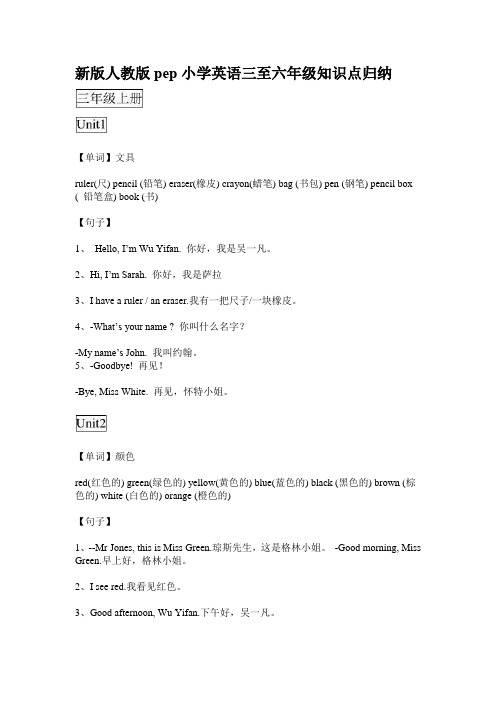
新版人教版pep小学英语三至六年级知识点归纳【单词】文具ruler(尺) pencil (铅笔) eraser(橡皮) crayon(蜡笔) bag (书包) pen (钢笔) pencil box ( 铅笔盒) book (书)【句子】1、Hello, I’m Wu Yifan. 你好,我是吴一凡。
2、Hi, I’m Sarah. 你好,我是萨拉3、I have a ruler / an eraser.我有一把尺子/一块橡皮。
4、-What’s your name ? 你叫什么名字?-My name’s John. 我叫约翰。
5、-Goodbye! 再见!-Bye, Miss White. 再见,怀特小姐。
【单词】颜色red(红色的) green(绿色的) yellow(黄色的) blue(蓝色的) black (黑色的) brown (棕色的) white (白色的) orange (橙色的)【句子】1、--Mr Jones, this is Miss Green.琼斯先生,这是格林小姐。
-Good morning, Miss Green.早上好,格林小姐。
2、I see red.我看见红色。
3、Good afternoon, Wu Yifan.下午好,吴一凡。
4、-Nice to meet you.见到你很高兴。
-Nice to meet you, too.见到你也很高兴。
5、Colour it brown!把它涂成棕色吧!【单词】身体部位face( 脸) ear (耳朵) eye (眼睛) nose(鼻子) mouth (嘴) arm (胳膊)hand(手) head (头) body (身体) leg (腿) foot (脚)【句子】1、--How are you?你好吗?--I’m fine, thank you.我很好,谢谢你。
--Let’s go to school!我们一起上学吧!2、Look at me !看我!3、Very well, thanks.很好,谢谢。
(完整版)三至六年级英语语法知识汇总

三至六年级英语语法知识汇总一、词类:1、动词:行为动词、be动词、情态动词。
(1)行为动词原形、+s/es、+ed、+ing,具体判断方法如下:(2)be动词a、Am--was Is --was Are--were 口诀:我用am, 你用are, is用在他她它,所有复数全用are。
b、肯定和否定句I am (not) from London. He /She is(not) a teacher. My hair is(not) long. Her eyes are(not) small.c、一般疑问句Am I …? Yes, you are. No, you aren’t. Are you/they…? Yes,we/ they are. No,we/ they aren’t. Is the cat fat? Yes, it is. No, it isn’t.is、am、are为一类,一般用于一般现在时、现在进行时和一般将来时中。
was和were为另一类,一般用于一般过去时。
(3)情态动词can、must、should、would、may。
情态动词后动词总是用原形。
(不受其他任何条件影响)2、名词这里强调两点:不可数名词都默认为单数,所以总是用is或者was。
如何加后缀:a.一般情况下,直接加-s,如:book-books, bag-bags, cat-cats, bed-bedsb.以s. x. sh. ch结尾,加-es,如:bus-buses, box-boxes, brush-brushes, watch-watchesc.以“辅音字母+y”结尾,变y为i, 再加-es,如:family-families, strawberry-strawberriesd.以“f或fe”结尾,变f或fe为v, 再加-es,如:knife-knivese.不规则名词复数: man-men, woman-women, policeman-policemen, policewoman-policewomen, mouse-mice child-children foot-feet ,.tooth-teeth fish-fish, people-people, Chinese-Chinese, Japanese-Japanese3、形容词(包括副词)形容词表示某一事物或的特征,副词表示某一动作的特征。
三至六年级英语必背知识点

一、基础语法1.一般现在时:表示经常性的、习惯性的或真理性的动作或状态。
2.一般过去时:表示过去一些时间发生的动作或存在的状态。
3. 表达过去习惯的方式:used to + 动词原形。
4.现在进行时:表示现在正在进行的动作,常与现在时间状语连用。
5. 情态动词can/could:表示能力、许可或请求。
6. 情态动词should/shouldn't:表示建议或劝告。
7.数词的表达方式:基数词和序数词的用法。
8.比较级和最高级的形式及用法:形容词和副词的比较级和最高级的构成和用法。
9. 定冠词和不定冠词的用法:the、a/an的用法。
10.名词单复数的形式及用法:不规则名词的复数形式。
二、日常用语1. 问候和道别的常用表达:例如Hello, Hi, Good morning, Goodbye, Bye等。
2. 自我介绍和介绍他人的常用表达:例如My name is…, I am…, This is…等。
3. 家庭和亲属的称呼:例如father, mother, sister, brother, grandparents等。
4. 日常生活中常用的动词和词组:例如eat, drink, sleep, get up, go to school, do homework等。
5. 表述喜欢和不喜欢的表达方式:例如I like…, I don't like…,I love…等。
6. 询问和表达年龄的句型:例如How old are you?, I am… years old等。
7. 询问和表达兴趣爱好的句型:例如What do you like to do?, I like…等。
9. 表述天气的常用句型:例如What's the weather like today?,It's sunny, rainy, cloudy等。
10. 询问和表达方向的句型:例如Excuse me, How can I get to…?, Go straight, Turn left/right等。
小学英语三到六年级知识点整合

三年级上册重点知识点复习Module 1Unit 1 I’m Sam.我是山姆。
Unit 2 How are you? 你好吗?一、重点短语:1. goodbye再见2.good morning 早上好二、重点句子:1. I am ...= I’m... 我是...2. How are you? 你好吗?3. I’m fine, thank you.我很好,谢谢。
Module 2Unit 1 I’m Ms Smart.我叫斯马特.Unit 2 What’s your name?你叫什么名字?一、重点短语good afternoon 下午好二、重点句子1. I’m fine. And how are you?我很好。
你呢?2. I’m fine too. Thank you.我也很好。
谢谢。
3. What’s your name? = Your name, please?你叫什么名字?I’m … / …我叫……4. W hat’s ...? = What is...? 是什么?Module 3Unit 1 Point to the door. (请)指向门。
Unit 2 Ponit to the desk. (请)指向桌子。
一、重点短语1. point to指向2. sit down 坐下3. stand up起立4. boys and girls 男孩女孩们二、重点句子1. Sit down, please!请坐下!2. Please stand up!请起立!3. Point to the door.指向门。
Module 4Unit 1 It’s red.它是红色的。
Unit 2 It’s a black dog.它是一只黑色的狗。
一、重点短语red cat 红色的猫blue cat 蓝色的猫green cat 绿色的猫black cat 黑色的猫yellow cap 黄色的帽子二、重点句子1.My name is Panpan. I’m a panda. 我叫盼盼。
人教版小学三至六年级英语知识点归纳总结

人教版小学三至六年级英语知识点归纳总结形式正确记忆家庭成员的称呼,如:husband。
wife。
brother。
sister。
uncle。
aunt。
son。
daughter。
掌握这些词汇可以帮助学生更好地描述自己的家庭和亲人。
掌握形容词的正确用法,如:beautiful。
old。
pretty。
tall。
short。
cute。
strong。
slim。
long等。
这些形容词可以用来描述人或物的外貌、特征和性质。
学生需要掌握名词的单数和复数形式。
比如:XXX。
mouse-mice等常见的名词复数形式需要记忆和掌握。
常见题型选择题、填空题、连线题、听力题等。
这些题型都会涉及到以上三个知识点的考察。
四年级上册英语专题动词时间考点掌握动词的基本形式、过去式和现在分词形式,如:play-played-playing等。
掌握时间的表达方式,如:days of the week。
months of the year。
seasons等。
掌握一些常用的动词短语,如:look after。
take care of。
get up等。
分值比例5-8分8-10分常见题型选择题、填空题、连线题、听力题等。
这些题型都会涉及到以上三个知识点的考察。
学生需要掌握动词的基本形式、过去式和现在分词形式,如:play-played-playing等。
这些动词形式在日常交流中经常用到,掌握它们可以帮助学生更好地表达自己的意思。
学生需要掌握时间的表达方式,如:days of the week。
months of the year。
seasons等。
这些时间词汇在日常生活中也经常用到,掌握它们可以帮助学生更好地描述时间和时间顺序。
学生需要掌握一些常用的动词短语,如:look after。
take care of。
get up等。
这些动词短语可以帮助学生更好地描述自己的行为和日常活动。
五年级上册英语专题代词形容词比较级考点掌握人称代词、物主代词、反身代词等代词的用法。
PEP三到六年级英语词汇,黑体白体
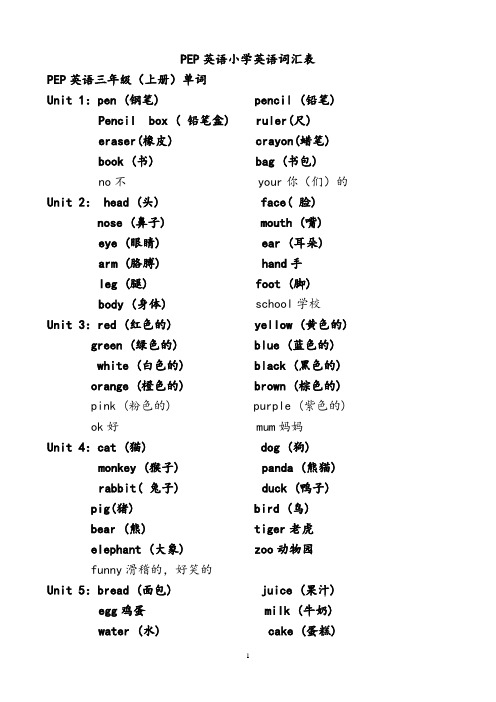
PEP英语小学英语词汇表PEP英语三年级(上册)单词Unit 1:pen (钢笔) pencil (铅笔) Pencil box ( 铅笔盒) ruler(尺)eraser(橡皮) crayon(蜡笔)book (书) bag (书包)no不 your你(们)的Unit 2: head (头) face( 脸)nose (鼻子) mouth (嘴)eye (眼睛) ear (耳朵)arm (胳膊) hand手leg (腿) foot (脚)body (身体) school学校Unit 3:red (红色的) yellow (黄色的) green (绿色的) blue (蓝色的)white (白色的) black (黑色的)orange (橙色的) brown (棕色的)pink (粉色的) purple (紫色的)ok好 mum妈妈Unit 4:cat (猫) dog (狗)monkey (猴子) panda (熊猫)rabbit( 兔子) duck (鸭子)pig(猪) bird (鸟)bear (熊) tiger老虎elephant (大象) zoo动物园funny滑稽的,好笑的Unit 5:bread (面包) juice (果汁) egg鸡蛋 milk (牛奶)water (水) cake (蛋糕)fish鱼 rice米饭Unit 6:one (一) two (二)three (三) four (四)five (五) six( 六)seven (七) eight (八)nine( 九) ten( 十)Brother兄弟 plate盘子PEP英语三年级(下册)单词Unit 1:student (学生) teacher (教师)UK英国 USA美国China中国 pupil小学生boy (男孩) girl (女孩)friend (朋友) she她he他and和new新的 today今天Unit 2:father (父亲;爸爸) dad (爸爸) (口语)mother (母亲;妈妈) mom 妈妈(口语)man (男人) woman(女人)grandmother (外)祖母 grandma (口语)(外)祖母grandfather(外)祖父 grandpa (口语)(外)祖父sister (姐妹) brother(兄妹)family家庭Unit 3:eleven (十一) twelve( 十二) thirteen (十三) fourteen (十四)fifteen(十五) sixteen (十六)seventeen (十七) eighteen (十八)nineteen (十九) twenty (二十)kite风筝 beautiful美丽的Unit 4:apple (苹果) pear (梨)orange (橙子) banana (香蕉)watermelon (西瓜) strawberry (草莓)peach (桃) grape (葡萄)buy买 fruit水果Unit 5:on在……之上 in在……里面Under在……之下 chair (椅子)desk课桌 cap帽子Ball球 car小轿车Boat船 map地图Toy玩具 box盒子Unit 6:thin瘦的 fat胖的tall (高的) short (短的;矮的)small (小的) big (大的)long (长的) giraffe (长颈鹿)so这么,所以 children小孩(复数)tail尾巴PEP四年级(上册)单词词汇表Unit 1: classroom(教室) window(窗户)blackboard(写字板) light(灯,灯管)picture(画,图画) door (门)teacher’s desk(讲台) computer(计算机)wall(墙) fan(扇子,电扇)floor(地板 ) clean(打扫,清洁,擦干净的)near(在......的旁边) help帮助really真的 TV电视Unit 2: schoolbag(书包) math book(数学书)English book(英语书) Chinese book(语文书)story-book(故事书) notebook(笔记本)Candy糖果 toy玩具Key钥匙wow哇Lost丢失 so much 非常的Cute可爱的Unit 3:strong强壮的 friendly友好的Quiet安静的 hair头发Shoe鞋子 glasses眼镜His他的 or或者Right正确的 hat帽子Her她的jacket(夹克衫) shirt(衬衫) skirt(裙子) dress(连衣裙) T-shirt(T恤衫) red(红色的) blue(蓝色的) yellow(黄色的) green(绿色的 ) white(白色的) no(不;不是) not(不;不是的) colour(颜色)Unit 4:bedroom卧室 living room客厅Study书房 kitchen厨房Bathroom浴室 bed床Phone电话 table桌子Sofa沙发 fridge冰箱Find找到 them他们Unit 5:beef牛肉 chicken鸡肉Noodles面条 soup汤Vegetable蔬菜 chopsticks筷子Bowl碗 fork叉子Knife刀 spoon勺子Dinner晚餐 ready准备好Help yourself为(自己)取用pass给,递Try尝试Unit 6:parents父母 cousin同辈表亲Uncle叔叔 aunt阿姨Baby宝贝 doctor医生Cook厨师 driver司机Farmer农民nurse护士People人们 but但是Little小的 puppy小狗Football player足球运动员 job工作Basketball篮球PEP四年级(下册)单词词汇表Unit 1:first floor一楼 second floor二楼Teachers ‘office教师办公室 library图书馆Playground操场 computer计算机房Art room美术教室 music room音乐教室Next to 紧邻 homework作业Class班级 forty四十Way方向Unit2 :breakfast早餐 English class班级Lunch午餐 music class音乐课PE class体育课 dinner晚餐Get up起床 go to school去上学Go home回家 go to bed上床睡觉Over结束 now现在o‘clock……点钟 kid小孩thirty三十 hurry up快点Unit 3:cold寒冷的 cool凉爽的Warm温暖的 hot热的Sunny阳光的 windy有风的Cloudy有运的 snowy下雪的Rainy有雨的outside在户外Be careful小心 weather天气New York纽约 how about……怎么样Degree度 world世界London伦敦 Moscow墨西哥Singapore新加坡 Sydney悉尼Fly飞,放(风筝)Unit 4:tomato西红柿 potato土豆Green beans豆角 carrot胡萝卜Horse马 cow奶牛Sheep羊 hen母鸡These这些 animal动物Those那些 garden花园Farm农场 goat山羊Eat吃Unit 5:clothes衣服 pants裤子Hat帽子 dress裙子Skirt女裙 coat外套Sweater毛衣 sock短袜Shorts短裤 jacket夹克Shirt衬衫yours你们的Whose谁的 pack收拾(行李)Wait等待Unit 6:glove手套 scarf围巾Umbrella雨伞 sunglasses太阳镜Pretty美观的 expensive昂贵的Cheap便宜的 nice好的Try on试穿 size尺码Of course当然 too太Just正好 how much多少Eight八 dollar美元Sale大减价 us我们的PEP五年级(上册)单词词汇表Unit 1:old (年老的) young (年轻的)funny (滑稽可笑的) kind (和蔼的、亲切的)strict (严格的) polite有礼貌的hard-working辛勤的 helpful有帮助的clever聪明的 shy害羞的know知道 our我们的Ms.女士 will将要Sometimes有时 robot机器人Him他 speak讲Finish完成Unit 2:Monday (星期一) Tuesday (星期二)Wednesday (星期三) Thursday (星期四)Friday (星期五) Saturday (星期六)Sunday (星期天) weekend周末Wash洗 wash my clothes洗衣服Watch TV看电视 do做Do homework做作业 read读Read books看书 play玩耍Play football踢足球cooking烹饪Often经常 park公园Tired疲倦的 sport运动Play sports做体育运动 should应该Every每个 day天Schedule工作计划Unit 3:Sandwich三明治 salad沙拉Hamburger汉堡包 ice cream冰淇淋Tea茶 fresh新鲜的Healthy健康的 delicious美味的Hot热的 sweet甜的Drink喝 thirsty口渴的Favourite最喜欢的 food食物Dear亲爱的 onion洋葱Unit 4: sing唱 song歌曲Sing English song 唱英文歌 play the pipa弹琵琶Kung fu功夫 dance跳舞Draw画画 cartoon漫画Cook烹饪 swim游泳Play basketball打篮球 speak English说英语Party聚会 next下一个Wonderful极好的 learn学习Any任何的 problem问题Want想要 send邮寄Email电子邮件 at后接邮件地址I’d like to = I would like toUnit 5:clock闹钟 plant植物Bottle瓶子 water bottle 水瓶Bike自行车 photo相片Front正面 in front of在……正面Between在……中间 above在……上面Beside在……旁边 behind在……后面There在那里 grandparent祖父母Their他们的 house房子Lot大量=a lot of=lots of大量Flower鲜花 move搬家Dirty脏的 everywhere处处Mouse老鼠 live住Nature自然界Unit 6:forest(森林) river (河流)lake (湖泊) mountain (山;山脉)hill山丘 tree (树)bridge (桥) building (建筑物)village (乡村;村庄) boating划船rabbit兔子 high高的PEP五年级(下册)单词词汇表Unit 1:do morning exercises(晨练) have …… class(上……课)play sports(进行体育运动) eat dinner(吃晚饭)Clean my room打扫我的房间 go for a walk散步Go shopping购物 take 上Dancing跳舞 take a dancing class上舞蹈课when(什么时候) after在……之后(时间)start开始 usually通常Spain西班牙 late晚的a.m.上午 p.m.下午why为什么 shop去买东西work工作 last上一个的sound听起来好像 also还,也busy忙的 need需要play剧本 letter信live居住 island岛always总是 cave洞穴go swimming去游泳 win获胜Unit 2:spring(春天) summer(夏天)Fall/autumn(秋天) winter(冬天)season季节) picnic野餐go on a picnic去野餐 pick摘snowman雪人which(哪一个)best(最;极) snow雪good job做得好 because因为vacation假期 all完全pink粉色 lovely可爱的leaf叶子 fall落下paint绘画Unit 3:Jan. /January(一月) Feb. /February(二月)Mar. /March(三月) Apr. /April(四月)May(五月) June(六月)July(七月) Aug./August(八月)Sept./September(九月) Oct./October(十月)Nov./November(十一月) Dec./December(十二月)Few不多,很少 a few一些Thing事情 meet集会Sports meet运动会 Easter复活节Trip旅行 year年Plant种植 contest比赛The Great wall national国家的National day国庆节 American美国的Thanksgiving感恩节 Christmas圣诞节Holiday假期 game游戏Roll滚动 look for寻找Chocolate巧克力 bunny兔子RSVP请赐复 by在……之前Unit 4:first第一 second第二Third第三 fourth第四Fifth第五 twelfth第十二Twentieth第二十 twenty-first第二十一Twenty-second第二十二 thirtieth第三十Special特别的 fool愚蠢的Kitten小猫 diary日记Still仍然 noise声音Fur皮毛 open开着的Walk行走Unit 5:mine我的 yours你们的His他的 hers她的Theirs他们的 ours我们的Climb(ing)攀爬 eat(ing)吃Play(ing)玩 jump(ing)跳Drink(ing)喝 sleep(ing)睡Each每个 other其他Each other相互 excited兴奋的Like像Unit 6:keep保持 keep to the right靠右Keep your desk clean保持桌面干净Talk quietly小声讲话 turn顺序Take turns按照顺序来 bamboo竹子Its它的 show指引Anything任何事 else另外Exhibition展览 say说Have a look看一看 sushi寿司Teach教 sure当然Canadian加拿大 Spanish西班牙的PEP六年级(上册)单词词汇表Unit 1:science科学 museum博物馆by (经,乘) post office(邮局) bookstore(书店)cinema(电影院) hospital(医院)turn(转弯) right (右边)left(左边) straight(成直线地)crossing十字路口ask问sir先生 interesting有趣的Italian意大利的 restaurant 餐馆Pizza披萨 street街道Get到达 GPS全球卫星定位系统Give—gave给 feature特点Follow跟着 far较远的Tell告诉Unit 2:on foot(步行) by(表示方式)乘Bus公交车 train(火车)plane (飞机) ship (船;舰)subway (地铁) taxi出租车slow慢的 slow down减慢stop停下Mrs.夫人early早到的 helmet头盔must必须 wear穿戴attention注意 pay attention to注意traffic交通 traffic light 交通信号灯Munich慕尼黑 Germany德国Alaska阿拉斯加州 sled雪橇Fast快的 ferry轮渡Scotland英格兰Unit 3:visit拜访 film电影See a film 看电影 trip旅行Take a trip去旅行 supermarket超市Evening晚上 tonight今晚Tomorrow明天 next week下周Dictionary字典 comic滑稽的Word单词 comic book连环画Postcard明信片 lesson课程Space太空 travel旅行Half一半 price价格Mid-autumn festival中秋节 together一起Get together聚会 mooncake月饼Poem诗 moon月亮Unit 4:studies学习 puzzle疑问Hiking远足pen pal笔友hobby(爱好) jasmine茉莉idea想法 amazing令人惊奇的shall表示征求 goal射门join加入 club俱乐部share分享Unit 5:factory 工厂 worker(工人)Postman邮递员 businessman商人Police officer警察 fisherman渔民Scientist科学家 pilot飞行员Coach教练 country国家Head teacher校长 sea大海Stay保持 university大学Gym体育馆 if如果Reporter记者 use使用Type打字 quickly迅速的Secretary秘书Unit 6:angry生气的 afraid害怕的Sad难过的 worried担心的Happy高兴的 see a doctor看医生Wear穿 more更多的Deep深的 breath呼吸Count数数 take a deep breathcount to ten数到十chase追赶mice老鼠 bad邪恶的hurt伤害 ill有病的wrong错的,有毛病的 should应该feel感到 well健康sit坐 grass草hear听到 ant蚂蚁worry担心 stuck陷住mud泥 pull拉everyone每个人PEP六年级(下册)单词词汇表Unit 1:young—younger 更年轻的old—older 年龄更大的tall—taller更高的short—shorter 更矮的long—longer 更长的strong—stronger更强壮的thin—thinner 更瘦的heavy—heavier 更重的big—bigger更大的small—smaller (体型)更小的dinosaur恐龙 hall大厅than 与…..相比较, both两个都kg ( kilogram )千克;公斤 countryside乡村lower更低的 shadow影子cm ( centimeter ) 厘米 smarter更聪明的become变成Unit 2:wash—washed 洗clean—cleaned打扫stay—stayed停留have—had有 have a cold感冒sleep—slept睡 read-read读see—saw看 last最近的yesterday昨天 before在……之前drink—drank喝 show秀magazine杂志 better更好的faster更快的 hotel旅行fix—fixed修理 break—broken破损的lamp台灯 loud喧闹的enjoy享受 loud喧闹的enjoy享受的 stay暂时Unit 3:go—went走 camp露营Went camping 去露营 fish鱼Went fishing 去钓鱼 ride—rode骑Hurt伤害 eat—ate吃Take—took拍照 take pictures照相Buy—bought买 gift礼物Fall—fell摔倒 off从……落下Labor day劳动节 mule骡子Turpan吐鲁番 can—could能Till直到 beach沙滩Basket篮子 part角色Lick舔——licked laugh—laughed笑Unit 4:Dining hall饭厅 grass草坪Gym体育馆 ago以前Cycling骑自行车 ice-skate滑冰Badminton羽毛球star星Easy容易的 look up查阅Internet互联网 different不同的Active活跃的 race赛跑Nothing没什么 think—thought思考Feel—felt感觉 cheetah猎豹Trip绊倒,旅行 wake—woke醒着Dream梦。
小学三至六年级英语复习知识点梳理汇总

小学三至六年级英语复习知识点梳理汇总好好学习,天天向上,你是最棒的!小学三至六年级英语复习知识点梳理汇总第一册(三年级上)一、词汇常用物品:door。
window。
desk,chair。
blackboard。
schoolbag。
pencil。
pen。
book。
cap,present。
cake。
ball。
kite (门,窗,桌子,椅子,黑板,书包,铅笔,钢笔,书,帽子,礼物,蛋糕,球,风筝)颜色:red。
blue。
yellow。
green。
black(红色,蓝色,黄色,绿色,黑色)动物:panda。
dog。
cat。
bird。
chameleon(熊猫,狗,猫,鸟,变色龙)数字:one。
two。
three。
four。
five。
six。
seven。
eight。
nine。
ten,eleven。
twelve(一,二,三,四,五,六,七,八,九,十,十一,十二)身体器官:head。
leg。
foot。
arm。
hand。
nose。
eye。
mouth。
ear(头,腿,脚,手臂,手,眼睛,鼻子,嘴巴,耳朵)家庭成员:mother。
father。
grandpa。
grandma。
sister。
brother(妈妈,爸爸,爷爷,奶奶,姐姐,弟弟)职业:teacher。
pupil。
doctor。
driver。
nurse。
farmer。
policeman(老师,学生,医生,护士,司机,农民,警察)代词:I。
you。
it。
me。
he。
she。
your。
my。
his。
her。
this。
that(我,你,它,我,他,她,你的,我的,他的,她的,这个,那个)进修是件康乐的事情,加油!好好学习,天天向上,你是最棒的!二、句型1、打号召及问好:Hello!(你好)Hi!(你好)早上晤面说:Good morning.(上午好!)下午见面说:Good afternoon.(下午好!)跟人道别语:Goodbye.(再见)Byebye.(再见)跟人道谢语:Thank you!(谢谢你!)Thanks!(多谢)询问对方的身体情况:How are you?I’m fine。
- 1、下载文档前请自行甄别文档内容的完整性,平台不提供额外的编辑、内容补充、找答案等附加服务。
- 2、"仅部分预览"的文档,不可在线预览部分如存在完整性等问题,可反馈申请退款(可完整预览的文档不适用该条件!)。
- 3、如文档侵犯您的权益,请联系客服反馈,我们会尽快为您处理(人工客服工作时间:9:00-18:30)。
小学英语词汇归类表(三年级上册----六年级下册)一、学习用品(school things) pen(钢笔) pencil(铅笔) pencil-case(铅笔盒) ruler(尺子) book(书) post card(明信片) comic book(漫画书) bag(包) newspaper(报纸) schoolbag (书包) eraser(橡皮) crayon(蜡笔) sharpener(卷笔刀) story-book(故事书) notebook(笔记本) Chinese book(语文书) English book(英语书) math book(数学书) magazine(杂志) dictionary(字典,词典)二、人体(body)foot(脚) nose(鼻子) head(头) face(脸) hair(头发) mouth(嘴) eye(眼睛) ear(耳朵) arm(手臂) hand(手) finger(手指) leg(腿) tail(尾巴)三、颜色(colours)colour(颜色) red(红) blue(蓝)yellow(黄)green(绿)white(白) black(黑) pink(粉红) purple(紫) orange(橙) brown(棕)四、动物(animals)cat(猫)dog(狗)pig(猪)duck(鸭)rabbit(兔)horse(马) elephant(大象)fish(鱼)kangaroo(袋鼠)ant(蚂蚁) bird(鸟) eagle(鹰) beaver(海狸) snake(蛇) mouse(老鼠) squirrel(松鼠) monkey(猴) panda(熊猫) bear(熊) lion(狮子) tiger(老虎) fox(狐狸) zebra(斑马) deer(鹿) giraffe(长颈鹿) goose(鹅) hen(母鸡) turkey(火鸡) lamb(小羊) sheep(绵羊) goat(山羊) cow(奶牛) donkey(驴) squid(鱿鱼) lobster(龙虾) shark(鲨鱼) seal(海豹) sperm whale(抹香鲸) killer whale(虎鲸)五、人物(people)friend(朋友)boy(男孩)girl(女孩)mother(母亲) father(父亲)sister(姐妹)brother(兄弟)uncle(叔叔,舅舅)mom(妈妈) grandpa/ grandfather(祖父,外祖父) man(男人) woman(女人) Mr(先生) Miss(小姐) lady(女士,小姐) dad(爸爸) parents(父母) grandma/ grandmother(祖母,外祖母) aunt(姑姑) cousin(堂表兄弟,堂表姐妹) son(儿子) baby(婴儿) kid(小孩) classmate(同学) queen(女王) visitor(参观者) neighbour(邻居) principal(校长) university student(大学生) pen pal(笔友) tourist(旅行者) people(人物) robot(机器人)六、职业(jobs)teacher(教师)student(学生)doctor(医生)nurse(护士) driver(司机)farmer(农民)singer(歌唱家)writer(作家)actor(男演员) actress(女演员)artist(画家)TV reporter(电视台记者)engineer(工程师) accountant(会计)policeman(警察)salesperson(销售员)cleaner(清洁工) baseball player(棒球运动员) assistant(售货员)七、食品、饮料(food & drink)rice(米饭) bread(面包) beef(牛肉) milk(牛奶)water(水) egg(蛋)fish(鱼) tofu(豆腐)chicken(鸡肉) honey(蜂蜜) lunch(中餐) cake(蛋糕) hot dog(热狗) hamburger(汉堡包) French fries(炸薯条) cookie(曲奇) biscuit(饼干) jam(果酱) noodles(面条) meat(肉) pork(猪肉) mutton(羊肉) vegetable(蔬菜) salad(沙拉) soup(汤) ice-cream(冰淇淋) ice(冰) Coke(可乐) juice(果汁) tea(茶) coffee(咖啡) breakfast(早餐) dinner(晚餐)八、水果、蔬菜(fruit & vegetables)apple(苹果)banana(香蕉)watermelon(西瓜) pear(梨)orange(橙)grape(葡萄)eggplant(茄子)green beans(青豆) tomato(西红柿)potato(土豆) peach(桃) strawberry(草莓) cucumber(黄瓜) onion(洋葱) carrot(胡萝卜) cabbage(卷心菜)九、衣服(clothes)jacket(夹克衫)shirt(衬衫)T-shirt(T恤衫)shirt(短裙子) dress(连衣裙)jeans(牛仔裤)pants(长裤)socks(袜子)shoes(鞋子) sweater(毛衣) coat(上衣) raincoat(雨衣) shorts(短裤) sneakers(网球鞋) slippers(拖鞋) sandals(凉鞋) boots(靴子) hat(有沿的帽子) cap(便帽) tie(领带) scarf(围巾) gloves(手套) sunglasses(太阳镜)十、交通工具(vehicles)bike(自行车)bus(公共汽车)train(火车)boat(小船) ship(轮船) yacht(快艇) car(小汽车) taxi(出租车) jeep(吉普车) van(小货车) plane(飞机) subway(地铁) motor cycle(摩托车) 十一、杂物(other things)window(窗户)door(门)computer(计算机) desk(课桌)chair(椅子)bed(床) board(写字板)teacher’s desk(讲台)fan(风扇) light(灯)wall(墙壁)floor(地板) picture(图画,照片)curtain(窗帘) closet(壁橱) trash bin(垃圾箱) mirror(镜子)end table(床头柜)football(足球) present(礼物) walkman(随身听) lamp(台灯) phone(电话) sofa(沙发) shelf(书架) fridge(冰箱) table(桌子) air-conditioner(空调) TV(电视) key(钥匙) lock(锁) photo(照片) chart(图表) plate(盘子) knife(刀) fork(叉) spoon(勺子) chopsticks(筷子) pot(锅) gift (礼物) toy(玩具) doll(洋娃娃) jigsaw puzzle(拼图游戏) ball(球) kite(风筝) balloon(汽球) box(盒子) umbrella(伞) zipper(拉链) violin(小提琴) yo-yo(溜溜球) nest(鸟窝) toothbrush(牙刷) hole(洞) tube(管子) menu(菜单) e-card(电子贺卡) e-mail(电子邮件) money( 钱) medicine(药)十二、地点(locations)home(家)room(房间)living room(起居室,客厅) bedroom(卧室)study(书房)kitchen(厨房)bathroom(卫生间) classroom(教室)school(学校)park(公园)library(图书馆)post office(邮局)hospital(医院)cinema(电影院) bookstore(书店)farm(农场) zoo(动物园) garden(花园) playground(操场) canteen(食堂) gym(体育馆) teacher’s office(教师办公室) washroom(卫生间) art room(绘画教室) music room(音乐教室) computer room(计算机教室) TV room(电视机房) flat(公寓) company(公司) factory(工厂) fruit stand(水果摊) pet shop(宠物商店) nature park(自然公园) theme park(主题公园) supermarket(超市) bank(银行) the Great Wall(长城) science museum(科学博物馆) country(国家) village(乡村) city(城市)十三、课程(classes)class(课程)Chinese(中文,汉语)English(英语)math(数学).(体育) music(音乐) science (科学) sports(体育活动) Moral Education(思想品德课) Social Studied(社会课)十四、国家、城市(countries & cities)China/ PRC(中国) American/ USA(美国) UK(联合王国) England(英国) Canada/ CAN(加拿大) Australia(澳大利亚) New York(纽约) London(伦敦) Sydney(悉尼) Moscow(莫斯科) Cairo(开罗)十五、天气(weather)cold(寒冷的) warm(温暖的)cool(凉爽的)snowy(下雪的) sunny(晴朗的)hot(炎热的) rainy(下雨的) windy(有风的) cloudy(多云的) weatherreport(天气预报)十六、景物(nature)river(河流) lake(湖泊) stream(河、溪)forest(森林) path(路,小道)road(公路,大道)house(房子bridge(桥)building(建筑物)rain(雨)cloud(云)sun(太阳)mountain(山) sky(天空) rainbow(彩虹) wind(风) air(空气)十七、植物(plants)flower(花)grass(草)seed(种子)sprout(苗,芽,嫩芽)tree(树) plant(植物,种植)soil(土壤) rose(玫瑰) leaf(叶子)十八、星期(week)Monday/ Mon. (星期一)Tuesday /Tue. (星期二)Wednesday /Wed. (星期三)Thursday /Thu. (星期四)Friday /Fri. (星期五) Saturday /Sat. (星期六)Sunday /Sun. (星期日)weekend(周末)十九、月份(months)Jan.(January 一月)Feb.(February 二月)Mar.(March 三月) Apr.(April 四月)May(五月)June(六月) July(七月)Aug.(August 八月)Sept.(September 九月)Oct.(October十月)Nov.(November 十一月) Dec.(December 十二月)二十、季节(seasons)spring(春)summer(夏)fall(秋)winter(冬)二十一、方位(directions)left(左边)right(右边)east(东) west(西) south(南) north(北)二十二、患病(illness)hurt(疼痛)sore(疼的) have a cold(感冒) have a fever(发烧)have a toothache(牙疼)have a headache(头疼)have a sore throat(喉咙疼)二十三、数词(numbers)one(一) two(二) three(三) four(四) five(五) six(六)seven(七) eight(八)nine(九)ten(十) eleven(十一)twelve(十二)thirteen(十三) fourteen(十四) fifteen(十五)sixteen(十六) seventeen(十七) eighteen(十八) nineteen(十九) twenty(二十) thirty(三十) forty(四十) fifty(五十) sixty(六十) seventy(七十) eighty(八十) ninety(九十) hundred(百) first(第一) second(第二) third(第三) fourth(第四) fifth(第五) eighth(第八) ninth(第九) twelfth(第十二) twentieth(第二十)二十四、形容词(adj.)good(好的) big(大的)small(小的)long(长的)tall(高的)short(短的,矮的)young(年轻的) old(旧的,老的)strong(健壮的)thin(瘦的)active(积极活跃的)quiet(安静的)kind(和蔼亲切的)strict(严格的) smart(聪明的)funny(滑稽可笑的) tasty(好吃的)sweet(甜的)salty(咸的) sour(酸的)favourite(最喜爱的) fresh(新鲜的)clean(干净的)tired(疲劳的) excited(兴奋的)angry(生气的,愤怒的)happy(高兴的) sad(忧愁的,悲伤的) bored(无聊的,烦人的)taller(更高的)shorter(更矮的)stronger(更强壮的)older(年龄更大的)younger(更年轻的)bigger(更大的)heavier(更重的)longer(更长的) thinner(更瘦的)smaller(更小的) nice(好看的) fine(好的) great(很好的) heavy(重的) new(新的) fat(胖的) happy(快乐的) right(对的) hungry(饥饿的) cute(逗人喜爱的) little(小的) lovely(可爱的) beautiful(漂亮的) colourful(色彩鲜艳的) pretty(漂亮的) cheap(便宜的) expensive(昂贵的) juicy(多汁的) tender(嫩的) healthy(健康的) ill(有病的) helpful(有帮助的) high(高的) easy(简单的) proud(骄傲的) sick(有病的) better(更好的) higher(更高的)二十五、介词(prep.)in(在……里)on(在……上,在……时候)under(在……下面)near(在……旁边)behind(在……后面)next to(与……相邻)at(在……点钟) by(经……乘……)for(为……,给……) to(朝,向) over(在……上方) in front of(在……前面) 二十六、代词(pron.)I(我)me we(我们)us you(你,你们)you he(他)him she(她)herit(它)it they(他/她/它们)them my(我的)mine our(我们的)ours your(你的,你们的)yours his(他的)his her(她的)hers this(这,这个) that(那,那个)二十七、动词(v.)work(工作) play(玩,踢) swim(游泳) skate(滑冰) fly(飞) jump(跳) walk(走) run(跑) climb(往上爬) fight(打架) swing(荡) eat(吃) sleep(睡觉) like(像,喜欢) have(有,吃) turn(转弯) buy(买) take(买,带) live(居住) teach(教)stop(停,停车站) wait(等) study (学习) learn(学习) sing(唱歌) dance(跳舞) row(划) do homework(做作业) watch TV(看电视) read books(读书) cook the meals(做饭) water the flowers(浇花) sweep the floor(扫地) clean the bedroom(打扫卧室) make the bed(铺床) set the table(摆饭桌) wash the clothes(洗衣服) do the dishes(洗碗碟) use a computer(使用计算机) eat breakfast(吃早饭) eat dinner(吃晚饭) do morning exercises(晨练,做广播操) go to school(上学) play sports(进行体育运动) get up(起床) have English class(上英语课) climb mountains(爬山) play the piano(弹钢琴) fly kites(放风筝) make a snowman(堆雪人) plant trees(种树) draw pictures(画画) cook dinner(做饭) read a book(看书) answer the phone(接电话) listen to music(听音乐) clean the room(打扫房间) write a letter(写信) write an e-mail(写电子邮件) drink water(喝水) take pictures(照相) watch insects(观察昆虫) pick up leaves(采摘树叶) do an experiment(做实验) catch butterflies(捉蝴蝶) count insects(数昆虫) collect insects(收集昆虫) collect leaves(收集树叶) write a report(写报告) play chess(下棋) have a picnic(举行野餐) get to(到达) ride a bike(骑自行车) play the violin(拉小提琴) make kites(制作风筝) collect stamps(集邮) go shopping(买东西) go swimming(去游泳) go fishing(去钓鱼) go hiking(去远足) go skiing(去滑雪) go ice-skating(去滑冰) visit grandparents(看望祖父母/外祖父母) meet(见面) welcome(欢迎) thank(谢谢) love(爱) drink(喝) taste(尝) smell(闻) feed(喂养) shear(剪) milk(挤奶) look(看) guess(猜) help(帮助) pass(传递) show(展示) use(使用) clean(打扫) open(打开) close(关上) put(放) read(读) write(写) paint(绘画) tell(告诉) kick(踢) bounce(反弹) ride(骑) find(寻找) drive(驾驶) fold(折) send(寄) wash(洗) shine(照耀) become(变成) feel(感觉到) think(思考) fall(落下) leave(离开) wake up(醒来) put on(穿上) takeoff(脱掉) hang up(挂起) wear(穿) go home(回家) go to bed(上床睡觉) play computer games(玩电脑游戏) do housework(做家务) empty the trash(倒垃圾) put away the clothes(收拾衣服) get off(下车) take a trip(去旅行) read a magazine(阅读杂志) go to the cinema(去看电影)二十八、其他(others)day(天,日子) today(今天) date(日期) yes(是,是的) no(不,不是) not(不,不是的) o’clock(……点钟) time(时间) here(这儿,这里) there(那儿,那里) very(很,非常) but(但是) then(然后) and(和) too(也,太) next week(下周) last(上一个,仅余的,留在最后的) noon(中午) evening(夜晚,晚上) please(请) usually(通常,一般) often(经常) sometimes(有时候) hobby(兴趣,爱好) best(最,极) because(因为) straightly(成直线地) birthday(生日) traffic(交通) traffic light(交通灯) traffic rule(交通规则) matter(事情,麻烦) should(应该) come from(从……来,来自……) this morning(今天上午) this afternoon(今天下午) this evening(今天晚上)二十九、动词的第三人称单数形式watch—watches teach—teaches wash--washes go—goes do—does have—has read —reads live—lives三十、动词的-ing形式run—running swim—swimming shop—shopping sit—sitting put—putting have—having live—living make—making take—taking use—using dive—diving write—writing ride—riding go—going do—doing walk—walking jump—jum ping climb—climbing play—playing teach—teaching catch—catching watch—watc hing read—reading cook—cooking clean—cleaning answer—answering listen—listening collect—collecting count—counting三十一、动词的过去式watch—watched wash—washed is/am—was are—were clean—cleaned play—played visit—visited learn—learned climb—climbed row—rowed dance—danced do—did go—went sing—sang eat—ate take—took have—had see—saw buy—bought read—read hurt—hurt draw—drew put--put三十二、形容词的比较级tall—taller short—shorter old—older young—younger small—smaller long—longer strong—stronger big—bigger thin—thinner heavy—heavier三十三、疑问词what(什么) which(哪一个) when(什么时候) where(在哪里) why(为什么) how(怎样,如何) how many(多少) how much(多少钱) what about…(……怎么样)what time(几点)三十四、单词的缩写I’m = I am it’s = it is he’s = he is she’s = she is that’s = thatis who’s = who is what’s = what is they’re = they are isn’t = is not aren’t = are not can’t = cannot don’t = do not doesn’t = does not let’s = let us三十五、同音词one—won two--too four—for by—buy red—read no—know flour—flower wear—where there—their pair--pear ear—year flu--flew hear—here I—eye B—be C —see R—are T—tea U—you son—sun right—write weak--week小学PEP英语四会单词和句子四年级home room school classroom doorchair bed desk window bread egg milk water rice beef chicken fish sister bro ther father mother farmer driver nurse doctor computer board fan light teacher’sdesk picture floor wall one two three four five six seven eight nine ten music math Chinese English . red blue yellow green white skirt shirt jacket dress T-shirt jeanspants socks shoes sunny warm cold snowy big small long short nice apple banana pear orangewatermelon cat rabbit pig duck dog eleven twelve thirteen fifteen twenty This is my computer. That is your computer. Is this a teacher’s desk Yes, it is. What time is it It’s two o’clock. It’s 9:45.I t’s time for math class.Is this your T-shirt No, it’s not. What colour is it It’s white.It’s warm today.Let’s play football.It’s cool.Is it cold Yes, it is. / No, it isn’t. It’s……How much is it It’s ten yuan. How much arethey They’re three yuan. Are they ducks No, they aren’t. How many horses arethere Twelve.五年级上册young funny tall strong kind old short thin smart active strict quiet Monday (Mon.) Tuesday (Tue.) Wednesday (Wed.) Thursday (Thu.) Friday (Fri.) Saturday (Sat.) Sunday (Sun.) do homework watch TV read books green beans eggplant fish tofu potato tomato tasty sweet sour fresh salty cook the meals water the flowers sweep the floor clean the bedroom make the bed set the table wash the clothes do the dishes use a computer curtain trash bin closet mirror endtable clothes in on under behind near over in front of next tomountain river flowergrass lake forest path park house bridge tree road building Who’s your English teacher Mr. Carter. What’s he like He’s tall and strong. Is she quite No, she isn’t. She’s very active. Is she strict Yes, she is, but she’s very kind. What day is it today It’s Wednesday. What do you have on Thursday We have English, math and science on Thursdays. What do you do on Saturdays I watch TV on Saturdays. What do you have for lunch on Mondays We have tomatoes, tofu and fish. What’s your favourite fruit I like apples. They’re sweet. I like fruit. But I don’t like grapes.They’re sour. What can you do I can sweep the floor. I can cook the meals. I can water the flowers. Can you make thebed No, I can’t. Can you use a computer Yes, I can. There are two bedrooms, a kitchen, abathroom and a living room. There is a mirror, a bed and a big closet. The closet is near the table. Many clothes are in the closet. The trash bin is behind the door.Is there a forest in the park Yes, there is. Is there a river No, there isn’t.Are there any fish in the rivers Yes, there are.Are there any pandas in the mountains No, there aren’t.五年级下册do morning exercises eat breakfast have English class play sports eat dinner get up climb mountains go shopping play the piano visit grandparents go hiking spring summer fall winter season swim fly kites skate make asnowman plant trees January (Jan.) February (Feb.) March (Mar.) April(Apr.) May June July August (Aug.) September (Sept.) October (Oct.) November (Nov.) December (Dec.) draw pictures cook dinner read a book answer thephone do the dishes listen to music clean the room wash clothes write a letter write an e-mail fly jump walk run swim sleep climb fight swing drink water take pictures watch insects pick up leaves collect leaves do an experiment catch butterflies count insects write a report play chess have a picnic When do you eat dinner I eat dinner at 7:00 in the evening. When do you get up I usually get up at 12:00 at noon. What do you do on the weekend Usually I watch TV and go shopping. Sometimes I visit my grandparents. What about you I often play football. Sometimes I go hiking. Which season do you like best I like winter best. Summer is good, but fall is my favourite season. Why do you like summer Because I can swim in the lake. Why do you like winter Because I can sleep a long time. When is your birthday It’s in May. My birthday is in June. Uncle Bill’s birthday is in June, too. Is her birthday in June Yes. What’s the date June 9th . This is Zhang Peng. What are you doing I’m doing the dishes.I’m reading a book. Grandpa is writing a letter. Brother is doing homework. Mom is cooking dinner in the kitchen. He’s writing an e-mail in the study. What is it doing It’s eating bananas.What is she doingShe’s jumping. What are they doing They’re swimming.They’re climbing trees. Are you eating lunch No, we aren’t. Are they eating the honey Yes, they are. Is he playing chess Yes, he is. Is she counting insects No, she isn’t.六年级上册on foot by bike by bus by train by plane by ship by subway go toschool traffic lights traffic rules stop wait go get to library postoffice hospital cinema bookstore turn right turn left go straight this morning this afternoon this evening next week comic book post card newspaper ride abike dive play the violin make kites collectstamps lives teaches watches goes does doesn’t=does not singer writeractor actress artist TVreporter engineer accountant policeman cleaner salesperson rain cloud sun strea m seed soil sprout plant How do you go to school, Sarah Usually I go to school on foot. Sometimes I go by bike. How can I get to Zhongshan Park You can go by the bus. Where is the cinema, please It’s next to the hospital. Turn left at the cine ma, then go straight. It’s on the left. What are you going to do on the weekend I’m going to visit my grandparents this weekend. Where are you going this afternoon I’m going to the bookstore. What are you going to buy I am going to buy a comic book. Wha t’s your hobby I like collecting stamps. He likes collecting stamps, too. Does she teach English No, she doesn’t. Does she teach your math Yes, she does. What does your mother do She is a TV reporter. Where does she work She works in a school. How does she go to work She goes to work by bus. Where does the rain come from It comes from the clouds. How do you do that What should you do then六年级下册taller shorter stronger older younger bigger heavier longer thinner smaller have a fever hurt have a cold have a toothache have a headache have a sorethroat tired excited angry happy bored sad (watch TV - watched TV) (wash clothes- washed clothes) (clean the room- cleaned the room) (play football - played football) (visit grandparents- visited grandparents) do - did go - went (go to a park- went to a park) (go swimming- went swimming) (read a book-read a book) (go fishing- went fishing) (go hiking- went hiking) (learn Chinese-learned Chinese) (sing and dance-sang and danced) (eat good food-ate good food) (climb a mountain-climbed a mountain) (take pictures-took pictures) (buy presents – bought presents) (row a boat – rowed a boat) (see elephants – saw elephants) (go skiing-went skiing) (go ice-skating-went ice-skating) (get to –got to) (have – had) How tall are you I’m 164 cm tall.You’re shorter than me.You’re 4 cm taller than me. How heavy are you I’m 48 kg.I’m thinner and shorter than you. What’s the matter My throat is sore. My nose hurts. How are you, Liu Yun You look sohappy. How are you, Sarah You look sad today. What did you do last weekend I played football. Did you read books Yes, I did. / No, I didn’t. Where did you go on you r holiday I went to Xinjiang. How did you go there I went by train.小学英语三年级上册重点句子: Hello! 你好 B: Hi! 你好!: Hello,I’m Wu Yifan.你好,我是吴一凡。
